Rod Dreher's Blog, page 40
November 24, 2021
Call The #WaukeshaMassacre What It Is
The killers of Ahmaud Arbery were found guilty of murder today. Good. Sure did seem like they were guilty. Kyle Rittenhouse got justice last week, and the Arbery murderers did this week. Looking good for the jury system.
But it continues to look bad for the media and the professional neoracists (but I repeat myself) regarding the Waukesha Christmas Parade Massacre. Do you remember when that white guy in Georgia, Robert Aaron Long, who shot up those massage parlors? Most of the women he killed were Asian; he told police that he had a sex addiction, and these were the places he went to do the sexual things that made him hate himself and others. Cops said there was no reason to believe that the killings were driven by racial animus; the guy was a sex freak, and the kind of women who staff massage parlors (the kinds that are fronts for sexual activity) are Asian.
Nevertheless, the media went berserk calling this an anti-Asian hate crime. To be clear, it is fair and responsible to ask the question, “Was this driven by racial malice?”, but the media were so eager to find a white man who mass-murdered non-white victims that they just didn’t stop, even though no evidence emerged for a racial motivation.
So, in Waukesha, we have a suspect in custody who deliberately drove a speeding car through a Christmas parade. The suspect is black, and has a history of posting anti-white hatred on social media, and attacked a parade in a suburb that is 89 percent white, with a black population of only 3.5 percent. We still don’t have a clear racist motive for the attack, but for pity’s sake, if you’re looking to see if a racist motive exists, the plain facts of this case give you a lot to work with. But our media? No. Looking the other way.
This is how they roll. In this long NPR report about the arrest of a New York man in a horrible case of anti-Asian hate, not once does NPR mention the word “black” — the race of the man who beat the old Filipino woman. The only reason you know he’s black is because of a tweet put out by the NYPD taken from surveillance video. NPR frames the whole thing as a crime motivated by racial bias, which it clearly seems to have been, but they take care not to mention the race of the alleged perpetrator. Why not? This was a conscious decision. It had to have been.
Meanwhile, in San Francisco, large mobs of black men are looting stores. We know this from security video. But one San Francisco media outlet is policing words:
How left-wing postmodernism works: the word “looting” is criticized more than the act of looting itself. Symbolic interpretation is prioritized over physical reality—all in service of elite political ideology. pic.twitter.com/4Y7w5I5rZ1
— Christopher F. Rufo
(@realchrisrufo) November 24, 2021
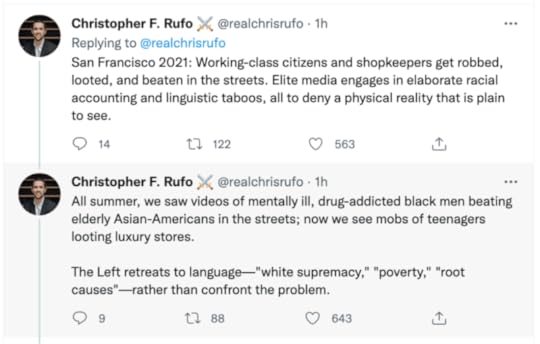
We were treated to a fusillade of stories about anti-Asian hate after the Atlanta killings — see what turns up at The New York Times when you put the terms “Atlanta” and “anti-Asian” into the search engine — and look, I’m not going to say that they’re all phony, because Asians really were being attacked in unusual numbers. But if memory serves, in the cases where there was video, the attackers were usually black — a fact that somehow rarely if ever made it into the media reporting. Four black girls in Philadelphia have been arrested and charged with a bias crime for this attack on defenseless Asians on the subway there:
Footage of a violent assault on the SEPTA train in Philadelphia today: pic.twitter.com/pBulJ0rbZt
— Libs of Tik Tok (@libsoftiktok) November 18, 2021
We all know that if four whites had assaulted two non-whites, especially two non-whites who didn’t fight back, that it would have been national news, and we would have had endless ABCNBCCBSPBSNPRCNNMSNBC thumb-sucking about What It Says About White Rage. When Rittenhouse was found not guilty, many in the media, and in left-wing organizations, denounced it as a triumph of racism, even though the men he shot were white.
But to our media, if the killer is non-white, and the victims are white, it’s hardly worth remarking on. Right?
Six people are dead in Waukesha. They happen to be white. The alleged killer — a black man — posted anti-white, pro-Hitler material online. Though a violent criminal, he was out on ridiculously low bail thanks to a squishy-liberal white Democratic DA who believes in “bail reform”. Some things are so obvious that even a liberal reporter should be able to see it. In France, when a Muslim terrorist drove through a crowd on the promenade in Nice, they called it terrorism, because it was. Why not this attack in Waukesha? Why not at least explore whether or not Darrell Brooks’s open racism had anything to do with this mass murder?
Why manage the news? I’m asking rhetorically, because I know perfectly well why they’re managing the news. It’s for the same reason that Catholic bishops covered up sex crimes by pedo priests: to control the narrative, avoid responsibility, and manage the anger of the rubes. Remember what ex-NYT reporter Nellie Bowles revealed recently about how Times editors spiked a Kenosha story of hers? Excerpt:

Meanwhile, this is Thanksgiving in the media’s America:
These innocent people should be celebrating thanksgiving with their families tomorrow.
Why isn’t Joe Biden or Kamala Harris visiting their families? #WaukeshaMassacre pic.twitter.com/DclDoLHcWF
— Mythinformed MKE (@MythinformedMKE) November 24, 2021
They hate us. They really do.
UPDATE: Because some of you ask, “us” = normal unwoke Americans.
The post Call The #WaukeshaMassacre What It Is appeared first on The American Conservative.
Paul Kingsnorth Hits Vaccine Tipping Point
If you don’t subscribe to Paul Kingsnorth’s Substack, you are missing out on some of the best writing on the Internet. He has just released an essay wondering what the hell is going on with Covid and our response to it. He’s asking the kinds of questions that our media ought to be asking, but are not. Here’s how it begins:
Perhaps it’s because I’m English, or perhaps it’s my age, or perhaps it’s just blind prejudice, but when I wake to the news that the Austrian government has interned an entire third of its national population as a ‘danger to public health’, a chill runs down my spine.
Austria, I think to myself. Ah.
I look at the news photos of armed, masked, black-clad police stopping people in the streets to ask for their digital papers, and I read stories of others arrested for leaving their own house more than the permitted once a day, and I hear Austrian politicians intoning that those who refuse to accede to the injection are to be shunned and scapegoated until they acquiesce. Then I watch interviews with ‘ordinary people’, and they say that the ‘unvaxxed’ had it coming. Some of them say that they should all be jailed, these enemies of the people. At best, the ‘anti-vaxxers’ are paranoid and misinformed. At worst they are malicious, and should be punished.
A few days later I wake up to some more news about Austria: from next year, everyone in the country will have a covid vaccine forced into them by the state, overriding their right to what certain people, who have gone very quiet recently, used to call ‘bodily autonomy.’
It’s about to be Germany too, according to German officials. Lockdown and forced vaccinations. Maybe — maybe — such police-state measures would be justified if vaccines worked. But notice this, says Kingsnorth:
I am watching all this from Ireland, the country which has the highest vaccination rate in Western Europe, at over 94% of the adult population. At the same time, curiously, we have the highest covid infection rates in Western Europe too. The government has not been able to explain this fact, but it is a trend that has recently manifested in some other highly-vaccinated places too: Gibraltar, Israel, West Flanders. High levels of vaccination do not seem to correspond with low-levels of disease; often quite the opposite.
In other parts of the world, strange things are happening too. Africa, for example. Africa’s population is the largest, fastest-growing and materially poorest of any continent. Few governments there can afford to supply their people with the pricey corporate vaccines which we in the West have staked our nations on. Only 6% of Africa’s population is vaccinated, and national healthcare systems barely exist in many places, yet the WHO describes the continent as ‘one of the least affected regions in the world’ by the virus. In fact, the richer, more ‘developed’ parts of the world seem to be suffering worst from the pandemic.
Nobody seems to be able to explain any of this, but that hasn’t changed the official direction of travel. Certainly in Ireland, the script remains the same. For six months we have been living with vaccine apartheid, with the ‘unvaxxed’ excluded from much of society, but it hasn’t worked. Rates of infection are shooting up as winter arrives – as you might expect with a respiratory virus. We were all told recently to work from home, and another lockdown is on the cards. A midnight curfew has recently been imposed on pubs and nightclubs. This is odd, as only vaccinated people have been allowed into them for months, and we have repeatedly been assured that vaccinated people are safe to be around.
In an honest society, all of this would have been subject to robust public debate. We would have seen scientists of all opinions openly debating on TV and radio and in the press; views of all kinds aired on social media; journalists properly investigating reports of both vaccine successes and vaccine dangers; serious explorations of alternative treatments; public debates about the balance between civil liberties and public health, and what ‘public health’ even means. But we have not seen this and we will not see it, for debate, like dissent, is out of fashion. The media here in Ireland has not asked a critical question of anyone in authority for at least eighteen months. Google’s algorithms are busy burying inconvenient data, while the social media channels from which most people receive their worldview are removing or suppressing critical opinions, even if they come from virologists or editors of the British Medical Journal.
Day after day, I have been waking and wondering: what is going on?
Paul, who remains unvaccinated, and explains why, says he’s not as worried about the vaccine itself as what the vaccine symbolizes. More:
We live in an apocalyptic time, in the original sense of the Greek word apokalypsis: revelation. What is happening on the surface is revealing what has always lain beneath, but which in normal times is hidden from view. All of the action now is in the underworld. Beneath the arguments about whether or not to take a vaccine that may or may not work safely, glides something older, deeper, slower: something with all the time in the world. Some great spirit whose work is to use these fractured times to reveal to us all what we need to see: things hidden since the foundation of the modern world.
Covid is a revelation. It has lain bare splits in the social fabric that were always there but could be ignored in better times. It has revealed the compliance of the legacy media and the power of Silicon Valley to curate and control the public conversation. It has confirmed the sly dishonesty of political leaders, and their ultimate obeisance to corporate power. It has shown up ‘The Science’ for the compromised ideology it is.
Most of all, it has revealed the authoritarian streak that lies beneath so many people, and which always emerges in fearful times. In the last month alone I have watched media commentators calling for censorship of their political opponents, philosophy professors justifying mass internment, and human rights lobby groups remaining silent about ‘vaccine passports.’ I have watched much of the political left transition openly into the authoritarian movement it probably always was, and countless ‘liberals’ campaigning against liberty. As freedom after freedom has been taken away, I have watched intellectual after intellectual justify it all. I have been reminded of what I always knew: cleverness has no relationship to wisdom.
I have learnt more about human nature in the last two years than in my preceding forty-seven. I have learnt some things about myself too, and I don’t especially like them either. I have noticed my ongoing temptation to become a partisan: to judge and condemn those on the other side of the question – those sheeple, those malicious enemies of Truth. I have noticed my tendency to seek out only sources of information which confirm my beliefs. Revelation is never comfortable.
Most of all, though, what the covid apocalypse has revealed to me is that when people are frightened, they can be easily controlled.
Control: this is the story of the times. Across the world we are seeing an unprecedented claim to control staked by the forces of the state, in alliance with the forces of corporate capital, over your life and mine. All of it converges on the revealed symbol of our age: the smartphone-enabled QR code that has, with frightening speed and in near-silence, become the new passport to a full human life. As ever, our tools have turned on us. Another revelation: they were never our tools to begin with. We were theirs.
One more passage:
My own sense of foreboding is deepening daily. Beneath the surface, down in those depths, I am far from the only one who can see what is emerging. The Narrative does not hang together, the story does not gel, but it is doing its job nonetheless. It is being used to summon forth and justify an unprecedented authoritarian technocracy which is hemming us all in with no consent, no debate, and no right to opt out.
In a short but momentous two years, this is who we have become. We in the West, who have spent decades, if not centuries, lecturing the rest of the world about ‘freedom’, and sometimes trying to bomb them into accepting it. We who invented this thing called ‘liberalism’; we who are now burying it. It didn’t take much, did it, for our words to be revealed as hollow?
Buy a subscription and read it all. Trust me, you will not regret it. His Substack essays are always terrific. With this one, Paul Kingsnorth moves himself from being someone you should read to someone you must read as a guide through the darkness ahead. Kingsnorth has reached a breaking point:
Next week I will write more on what I see happening, and where it is heading. But for now, it is enough to say that my personal Vaccine Moment has arrived. Where once I was on the fence, now I am firmly off it. Even if I were to be convinced that these vaccines worked safely, I could never get myself a vaccine passport and acquiesce in the technological segregation of society. I could never scan my code without shivering. I cannot participate in this.
We all have a breaking point, and we all should, because this is the means by which our human intuition screams to us that something is wrong. This is mine. I will not go along with what is happening. I will not validate what is emerging. I will resist it. I will take my stand.
Take a look, says Paul, at this clip from November 21 of the chief minister of Australia’s Northern Territory raging against the vaccine-hesitant — and not just the vaccine-hesitant, but anyone who questions mandates for any reason:
This man is a fanatic. And he holds immense power over the lives of Australians in his province.
As regular readers know, I am vaccinated (Johnson & Johnson), and got the jab first back in March because I am a middle aged fat guy who is immunocompromised. I don’t regret getting the vaccine, but given all the things Paul lists in his newsletter, I remain against vaccine mandates. What is the scientific reason that Covid cases are rising in even the most vaccinated places? You could claim, I guess, that without the vaccine Covid would be even worse in those places, but that’s not a falsifiable claim, is it? And even if you could prove it, would that still justify the extraordinary mandates that annul one’s right to control one’s body, and to refuse to allow the state to inject one with this serum?
Paul Kingsnorth is right to ask: What the hell is going on?! He is living with his wife and children in rural Ireland, and is now, or will soon be, a prisoner in his own home, because of his refusal to conform. I do hope you will subscribe to his fantastic newsletter, to give him the wherewithal to support his family under this duress, and to keep speaking out. And if you haven’t read his 2020 novel Alexandria, you should. It was written pre-Covid, but it is very much a tale for our times, in a way that Kingsnorth could not have anticipated. The novel set in the distant, post-apocalyptic future, and it is about the temptation to escape from bodily suffering by uploading one’s consciousness to the Cloud. By trusting everything to the technological solution, at the expense of one’s own humanity.
What have the Chinese done to us with this disease? What did their scientists create? I don’t believe this was released on purpose into the world — that would have been insane, from any perspective — but I do believe it was a lab leak. Why are scientists messing with things like this? We Americans helped pay for this gain-of-function research, you know, despite Dr. Anthony Fauci’s repeated lies denials. The scientific class is now demanding that we surrender our liberties and trust in a technical solution that they offer as a fix to the problem they created in the first place, by doing research nobody should have been doing. The prominent science journalist Matt Ridley reports on new information showing that the lab leak theory is even stronger.
I have come to believe that Covid is being used as an excuse to institute a social credit system. When Covid abates, eventually, you watch: the controllers will not back down. Having seen that people will comply if they can be made to fear, the regime (government + corporations + institutions) will manufacture reasons to make the public afraid of thought criminals, and manufacture consent to keep them from polluting the body politic with their “bigoted” thoughts, opinions, and beliefs. This is what the entire “safe space” ideology from the Left has been after: convincing people that words and ideas are infectious and dangerous, and that those bearing the bad ideas should be quarantined and suppressed.
Are you seeing now the importance of the warnings that anti-communist dissidents give in Live Not By Lies? None of them foresaw Covid — the book’s reporting ended before Covid emerged — but they did see the creation of an all-powerful controlling regime, and the socialization of the population into accepting totalitarian measures to protect it from the Enemy. As Kingsnorth points out, the Covid crisis is in some ways the excuse the Machine (his word) uses to do what it has always wanted to do.
Here in the US, we have to fight as hard as we can against vaccine mandates. I am already hearing from Europeans who are trying to get to America ahead of their own governments’ draconian measures. One anti-vax activist I know told me that with Austria’s decision, “A Rubicon has been crossed.”
Tell me, readers: why are some of the most vaccinated regions of the world experiencing surges in Covid cases? What is going on with this disease? I have now (as of last week) been double-vaxxed, and I have done a lot of traveling this year without acquiring Covid. You could say that I’m a success story. But a good friend was vaxxed, and still got Covid (“It’s the sickest I have ever been in my entire life,” he told me). We have always known that vaccines are not foolproof, that at best they give the vaccinated person better odds against the disease. The fact that we have some breakthrough cases is not surprising, and is not a foolproof case against getting vaxxed. Still, if Ireland is 94 percent vaxxed, shouldn’t it be almost entirely Covid-free? And why is Africa, which is not vaccinated, getting off so light?
As Kingsnorth says, the story does not hold together. Meanwhile, the people who administer our societies — including those who control the Narrative — are creating conditions leading to the stigmatization and punishment of the unvaccinated. It is always risky to compare anything to Nazi Germany, but if you know anything about pre-Nazi Germany, then you must be aware that the campaign against the Jews began years before Hitler arrived on the scene, with antisemitic German media likening Jews to parasites and bacilli infecting the body politic. German anti-Semites led a campaign in the media to construe Jews as akin to a fatal disease. It stood to reason that isolating them from everybody else was a sensible thing to do. We know where that ended up.
Will that happen here, with vaccine resisters? I would guess not, that it will stop before it goes that far. But I am not at all confident in that judgment. We keep telling ourselves it can’t happen here, when we have the testimony of Solzhenitsyn, as well as survivors of the Nazi regime, telling us that it bloody well can.
Along those lines, take a look at the Austrian Catholic academic Christiaan Alting von Geusau’s piece about the Five Stages of Dehumanization. Excerpt:
For its establishment and durability totalitarianism depends as a first step on mass support obtained through playing into a sense of permanent crisis and fear in society. This then feeds the urge of the masses to have those in charge constantly take “measures” and show leadership to ward off the threat that has been identified as endangering the whole of society. Those in charge can “remain in power only so long as they keep moving and set everything around them in motion.”The reason for this is that totalitarian movements build on the classical failure of societies throughout human history to create and uphold a sense of community and purpose, instead breeding isolated, self-centered human beings without a clear overarching purpose in life.
The masses following the totalitarian movement are lost themselves and as a result in search of a clear identity and a purpose in life that they do not find in their current circumstances: “Social atomization and extreme individualization preceded the mass movement (..). The chief characteristic of the mass man is not brutality and backwardness, but his isolation and lack of normal social relationships.”
How familiar this sounds to any person observing modern society. In an age where social media and whatever else is presented on screens set the tone above all else and where teenage girls fall into depression and increased suicide attempts because of the lack of “likes” on their Instagram account, we indeed see a disconcerting example of this lack of normal relationships that were instead meant to involve in-person encounters leading to profound exchanges. In Communist societies it is the Party that sets out to destroy religious, social and family ties to make place for a citizen that can be completely subjected by the State and the dictates of the Party, like we see happening in China and North Korea. In hedonistic and materialistic Western societies this same destruction happens through different means and under the neo-Marxist guise of unstoppable “progress,” where technology and a false definition of the purpose of science erodes the understanding of what it means to be human: “In fact,” writes Dreher, “this technology and the culture that has emerged from it is reproducing the atomization and radical loneliness that totalitarian communist governments used to impose on their captive peoples to make them easier to control.” Not only have the smartphone and social media drastically reduced genuine human interaction, as any teacher or parent of schoolchildren can attest to, but the social framework has in recent times further dramatically deteriorated through other major shifts in society.
The ever-growing Big-Tech and government policing of language, opinions, and scientific information in the SARS-CoV-2 pandemic, accompanied by a level of censorship not seen since World War II, has greatly reduced and impoverished the public discourse and seriously undermined trust in science, politics and the community.
In 2020 and 2021, mostly well-meant yet often ill-advised government-imposed Corona measures such as lockdowns, mask-mandates, entry-requirements to public facilities and Corona vaccine mandates have further massively limited the unimpeded human interaction that any society needs to retain and strengthen its social fabric. All these externally imposed developments contribute from different directions to human beings, especially the young, increasingly and ever more lastingly being deprived of those ‘normal social relationships’ Hannah Arendt speaks of. Seemingly lacking alternatives, this in turn leads large groups of the population – most of them not even realizing it – into the arms of totalitarian ideologies. These movements, however, in the words of Arendt, “demand for total, unrestricted, unconditional, and unalterable loyalty of the individual member (..) [since] their organization will encompass, in due course, the entire human race.”
The final goal of totalitarianism, she explains, is the permanent domination of human beings from within, thus involving each and every aspect of life, whereby the masses have to be kept constantly in motion since “a political goal that would constitute the end of the movement simply does not exist.” Without in any way wishing to downplay the gravity and urgency of these issues in and of themselves, or the need as a society to devise ways to deal with existential threats arising from them, Corona political and media narratives are examples of such an ideological totalitarianism that wants to completely control how human beings think, speak and act in that area of life, whist keeping them in perpetual anxiety through well-planned regular dramatic news updates (One tool being used for this successfully throughout the world is the constant well-rehearsed press conferences by grave-looking ministers in suits behind Plexiglas and flanked by experts and state flags), instrumentalized heartbreaking stories and calls to immediate action (“measures”), dealing with (perceived or real) new threats to their person, to their cause and to society as a whole. Fear is the main driving force behind keeping this perpetual anxiety and activism going.
More:
During my over 30 years of studying and teaching European history and the sources of law and justice, a pattern has emerged about which I already published in 2014 under the title “Human rights, history and anthropology: reorienting the debate.” In this article I described the process of “dehumanization in 5 steps” and how these human rights’ violations are not generally being perpetrated by ‘monsters,’ but for a large part by ordinary men and women – helped by the passive ideologized masses – who are convinced that what they are doing or participating in is good and necessary, or at least justifiable.
Since March 2020 we have been witnessing the global unfolding of a serious health crisis leading to unprecedented government, media and societal pressure being exerted on whole populations to acquiesce in far-reaching and mostly unconstitutional measures limiting people’s freedoms and in many cases through threats and undue pressure violating their bodily integrity. During this time, it has become increasingly clear that there are certain tendencies to be seen today that show some similarities to the sort of dehumanizing measures employed as a rule by totalitarian movements and regimes.
Endless lockdowns, police-enforced quarantines, travel restrictions, vaccine mandates, the suppression of scientific data and debate, large-scale censorship, and the relentless deplatforming and public shaming of critical voices are all examples of dehumanizing measures that should have no place in a system of democracy and the rule of law. We also see the process of increasingly relegating a certain part of the population to the peripheries whilst singling them out as irresponsible and undesired because of the “risk” they pose to others, leading to society gradually excluding them. The President of the United States expressed pointedly what this means in a major live-televised policy speech:
“We’ve been patient, but our patience is wearing thin. And your refusal has cost all of us. So, please, do the right thing. But just don’t take it from me; listen to the voices of unvaccinated Americans who are lying in hospital beds, taking their final breaths, saying, “If only I had gotten vaccinated.” “If only.”” – President Joe Biden September 9, 2021
The five steps
Those peddling political rhetoric today that sets up the “vaccinated” against the “unvaccinated, or vice versa, are going down a very dangerous road of demagoguery that has never ended well in history. Slavenka Drakulic, in her analysis of what led to the 1991-1999 Yugoslav ethnic conflict, observes:” (..) in time those ‘Others’ are stripped of all their individual characteristics. They are no longer acquaintances or professionals with particular names, habits, appearances and characters; instead they are members of the enemy group. When a person is reduced to an abstraction in such a way, one is free to hate him because the moral obstacle has already been abolished.”
Looking at the history of totalitarian movements eventually leading to totalitarian regimes and their campaigns of state-controlled persecution and segregation, this is what happens.
Read it all, to learn the Five Steps. Prof. Alting von Geusau’s essay, and Kingsnorth’s, might be the most important things you will read today.
UPDATE: From a friend in Romania:
I must say that we are all with a heavy heart due to the imminent introduction of the Green Pass in our country. Those of us who don’t want to get the vaccine will face suspension at work and in the end dismissal. And its not just that — although its hard as it can be, but its also the completely in-your-face system of segregation, annulation of the most basic rights, tyranny and gross propaganda that is taking form. No logic and no science can be in policies that constrain people by blackmailing them to get the vaccine (for them and soon for their children too). It cannot be for the sake of the ”public health” that the ”superclass elite” and their local bailiffs are willing to constrain and surveil people in spite of all the risks, social and political costs. The eschatological words of Jesus comes to mind: „For then shall be great tribulation, such as was not since the beginning of the world to this time, no, nor ever shall be. And except those days should be shortened, there should no flesh be saved” (In fact, in Romanian is not ”tribulation”, but ”strâmtorare”, wich means also to constrain, to force someone, and is much more close to the greek original). What is happening now is not some ”medical” problem; it’s a system of power and control both of the mind and of the body. After all, the soft totalitarianism is not to be found only in the ideological drive of the woke revolution; there it is, taking an ”objective” form and imposing upon us under the noble goal of saving lives.
The post Paul Kingsnorth Hits Vaccine Tipping Point appeared first on The American Conservative.
November 23, 2021
The Sacred & The ‘Real’
I’ve spent much of this afternoon going through boxes of documents and artifacts that my mother gave to me as she was cleaning out her house and preparing for her move. I wish I had worn a mask while doing it; the dust from decades of old papers — some going back to the 19th century — overwhelmed the Benadryl barrier. While working, I listened to this two-hour podcast of maximum heaviosity featuring Jordan Peterson, Bishop Robert Barron, John Vervaeke, and Jonathan Pageau.
They’re talking about meaning, and it is at times riveting and at times baffling, trying to keep up with them. But wow, it’s exhilarating to me as I get started on this new book project of mine, which is going to focus on this very issue, though from a particular perspective. Towards the end of the podcast, Bishop Barron said that the Church in our time erred by trying to be too much like the world, when instead it ought to be doing as Jordan Peterson is doing, and going back to the Scriptures to reveal deep meaning within them, as the Church Fathers did. My own book project is going to be in part about that, though I’m not going to focus on Scripture per se, but on the book of Nature (meaning, the material world as sign and pattern pointing to God and ultimate meaning).
As some of you know, I write a Substack newsletter that’s a lot quieter than what you read on this blog. I deliberately exclude current events and culture war topics, instead focusing on spirituality, art, and the things that give us hope. It’s a much more difficult thing to write than this blog, especially in this time of decline and disintegration. But this forthcoming book (no title yet) is going to be purely about learning to see reasons for hope. If you are a fan of the work of Pageau, Peterson, Vodolazkin, McGilchrist, and others of that genre, you will love this book, I bet.
Anyway, here’s something I sent out to my Substack readers after the book deal became official.
In the past, when I have been at the beginning of writing a book, I have felt the burden of the project acutely. Writing a book is hard. Even though I’ve gotten to be pretty good at it, it’s still intimidating to begin with a blank page in front of you, knowing that you have to fill about 220 of them with quality prose.
This time, it feels different. I don’t want to overthink it, but rather be grateful for that sense of peace and confidence that I am certain has been given to me by God. As you well know, so much of my work focuses on what’s wrong with the world. It hasn’t been only critique. Both The Benedict Option and Live Not By Lies identify what’s wrong, and offer advice on how to deal with this particular kind of brokenness we are now enduring.
But this new book, which doesn’t yet have a title, is going to be focused entirely on reasons to believe that God exists, and that He is everywhere present and filling all things. In one sense, it is going to be my account of where the hope that lives in me comes from, though of course I’m going to be telling the stories of others.
One of the audiences for this book is my 17-year-old self, sitting on the tour bus outside the Chartres cathedral, trying to decide if I should go in or not. Why wouldn’t I have gone? Why did I almost stay on the bus? Because I thought I had religion all figured out. What’s the point of looking at another old church? I went in because the prospect of boredom sitting on the bus waiting for all the old people on the guided tour to go through the cathedral was too much. You readers know that it was there that God first showed himself to me, and set the hook.
I want doubting young people who read this book to come away feeling that they should go inside the cathedral, because God is waiting for them there.
I’m also writing the book for people like myself: believers who are heavily laden with burdens that we can’t quite surrender to the Lord. For those who believe, but scan the world all the time for signs that help our unbelief to transform into a deeper faith. Reporting and writing this book will be for me something of a personal quest.
The other day at coffee hour, after the Sunday liturgy, I asked one of the young men who is a recent convert to Orthodoxy why he came in. He told me that the church he had been attending – a non-denominational Protestant church – never had answers for him. He said when he was 14, he would ask his pastor questions, and the pastor would fail to answer them – but then the question would arise in the pastor’s next sermon. “I figured that if I at fourteen, knowing nothing at all, could stump my pastor, that I must be in the wrong place,” he said.
Eventually he drifted, until he got a roommate who was Orthodox, and who invited him to church. The young man never left. In Orthodoxy, he found the depth he had been looking for, but thought did not exist.
You might remember that I spoke to a 16 year old boy, a newcomer, a couple of weeks ago, asking him what brought him to an Orthodox parish. He kept saying that Orthodoxy is “real,” and that he is in search of the “real.” He is a teenager, and struggled to be precise with words, but I understood him to be saying that Orthodoxy doesn’t play around. My twentysomething interlocutor this past Sunday certainly emphasized that. He said that in his previous churches, many Christians of his generation are always hedging their bets about what they believe, and how they live. In Orthodoxy, he said, that’s a lot harder to do. That’s why this way of following Christ feels more “real” to him.
I recalled those conversations this morning on the flight to Colorado Springs (I have a very quick trip to visit Focus On The Family and record a podcast), when I re-read the final chapter of Mircea Eliade’s great book The Sacred And The Profane. Both of these young men drawn to Orthodoxy talk about one form of the “realness” it offers, but I think there’s something deeper. The Eliade book captures it well. I’m going to quote Eliade here at length, because it captures my greatest hope for this book’s effect. My ambition for this book is somewhat insane, but … why not? Eliade writes:
What we find as soon as we place ourselves in the perspective of religious man of the archaic societies is that the world exists because it was created by the gods, and that the existence of the world itself “means” something, “wants to say” something, that the world is neither mute nor opaque, that it is not an inert thing without purpose or significance. For religious man, the cosmos “lives” and “speaks.” The mere life of the cosmos is proof of its sanctity, since the cosmos was created by the gods and the gods show themselves to men through cosmic life.
This is why, beginning at a certain stage of culture, man conceives of himself as a microcosm. He forms part of the gods’ creation; in other words, he finds in himself the same sanctity that he recognizes in the cosmos. It follows that his life is homologized to cosmic life; as a divine work, the cosmos becomes the paradigmatic image of human existence.
In this book I’m about to write, I have to teach the reader to regard himself as living in a cosmos: that is, an ordered universe filled with hierarchy and meaning. In the Middle Ages, the great cathedrals were constructed as visible models of the cosmos, to convey to the worshiper where he stands in the great chain of being, and how everything stands in relation to everything else. If you’ve ever been inside one of these buildings, you will likely have experienced the strange, wonderful feeling of being simultaneously diminished and elevated by awe.
Eliade tries to explain how to archaic man, religious similes were more than just metaphors: “Let us attempt to understand the existential situation of one for whom all these homologies are experiences and not simply ideas.” Yes! That neatly sums up the main approach I will be taking in this book: to talk to people who have not merely thought about God, but who have experienced Him in an extraordinary way.
Eliade says to religious man, it is necessary to be open to the world. “Openness to the world enables religious man to know himself in knowing the world – and this knowledge is precious to him because it is religious, because it pertains to being.” For religious man, he continues, “the whole of life is capable of being sanctified.”
Here is a passage in Eliade that stands the received modern narrative about the nature of religious people on its head:
We have seen that religious man lives in an open cosmos and that he is open to the world. This means (a) that he is in communication with the gods; (b) that he shares in the sanctity of the world. That religious man can live only in an open world, we saw when we analyzed the structure of sacred space; man desires to dwell at a center, where there is the possibility of communicating with the gods. His dwelling is a microcosm; and so too his body.
In other words, what if the truly religious are not the ones who hide from reality, but who are better able than seculars to to live in the world as it is?
Note too that Eliade says that for traditional religious man, his body and his home are integrated into the wider cosmos. The body is not a separate, autonomous entity. The great historian Peter Brown said that for the people of Late Antiquity, the body
was embedded in a cosmic matrix in ways that made its perception of itself profoundly unlike our own. Ultimately, sex was not the expression of inner needs, lodged in the isolated body. Instead, it was seen as the pulsing, through the body, of the same energies as kept the stars alive. Whether this pulse of energy came from benevolent gods of from malevolent demons (as many radical Christians believed) sex could never be seen as a thing for the isolated human body alone.
With this book, I hope to do my part to restore the old cosmic vision of interconnectedness and meaning. Why? Because it’s true, and I believe it is necessary for us to live within the fullness of our God-given nature. In this sense, the book will challenge Christians to be more traditionally Christian.
Eliade said that the loss of roots in the countryside has a lot to do with the desacralization of modern societies:
The cosmic liturgy, the mystery of nature’s participation in the Christological drama, have become inaccessible to Christians living in a modern city. Their religious experience is no longer open to the cosmos. In the last analysis, it is a strictly private experience; salvation is a problem that concerns man and his god; at most, man recognizes that he is responsible not only to God but also to history. But in these ma-God-history relationships there is no place for the cosmos. From this it would appear that, even for a genuine Christian, the world is no longer felt as the work of God.
That is so powerful, and so true. I can feel it myself. In theory I share this cosmic vision, based on my theological principles, and what it tells us about the nature of reality. But do I live as if I believed these things? No, not really. Sometimes. Mostly, though, I dwell in my head. One of the personal goals of this book is to learn how to get out of my head, and open myself up to God’s presence in His cosmos.
Eliade goes on to say that this openness to the cosmos means that even the little things — objects, gestures — in a religious man’s life matter:
It is his familiar everyday life that is transfigured in the experience of religious man; he finds a cipher everywhere. Even the most habitual gesture can signify a spiritual act. The road and walking can be transfigured into religious values, for every road can symbolize the “road of life,” and any walk a “pilgrimage,” a peregrination to the Center of the World.
Well, to be fair to myself, that’s pretty much how I live now. So maybe I’m not fully inside my head. But I do want to know more, and to grow spiritually. One great fault I have is a distaste for being in nature. It comes from a childhood growing up in Louisiana, where the presence of poisonous snakes makes being in the woods hazardous. I was particularly scared of snakes, so excursions into nature, which were frequent (I hunted a lot with my dad), were not pleasant.
But I have been in the past two or three years in forests in the Azores, which I think is snake-free, as well as in England, where the snakes are not as poisonous as in Louisiana, and I really, really loved it. It felt great to be in a wood where you didn’t have to keep your eyes peeled so that you don’t step on your death. So I know that my resistance to nature is limited. In researching this book, I will talk to Christians who experience God’s presence profoundly in nature. I want them to help me see what they see.
I find this line of Eliade’s to be crucial to the project:
[R]eligious man wants to be other than he finds himself on the “natural” level and undertakes to make himself in accordance with the ideal image revealed to him by myths.
This seems to be a key divide between traditional religion and modern, therapeutic conceptions of religion. The latter tries to help us to be okay with who we are, not call us to repent and live in a higher way — the way that is built into the structure of reality.
Similarly, here is Eliade defining religious man and nonreligious man:
Whatever the historical context in which he is placed, ‘homo religiosus’ always believes that there is an absolute reality, the sacred, which transcends this world but manifests itself in this world, thereby sanctifying it and making it real. He further believes that life has a sacred origin and that human existence realizes all of its potentialities in proportion as it is religious — that is, participates in reality.
I venture to say that whether these young inquirers and converts understand it or not, this is at bottom why Orthodoxy feels “real” to them: because the Orthodox Church has preserved this traditional understanding of the God-filled cosmos better than any other church in modernity. You don’t have to have the metaphysics proclaimed to you from the pulpit. Even if you don’t read a word of theology explaining how Orthodox Christianity views the connection between the spiritual world and the material world, come to services often enough and you will assimilate this way of seeing and being.
On the other hand, writes Eliade
the nonreligious man refuses transcendence, accepts the relativity of “reality,” and may even come to doubt the meaning of existence. …Man makes himself, and he only makes himself completely in proportion as he desacralizes himself and the world. The sacred is the prime obstacle to his freedom. He will become himself only when he is totally demysticized. He will not be truly free until he has killed the last god.
It can’t get any clearer than that. I wonder: is the nature of our time such that these are the only choices in front of us: either become religious in the archaic sense, or be drawn inexorably into the demysticization of the dying modern world. If Flannery O’Connor is right to say that you have to push back against the world as hard as it pushes against you, then yes, that might be the stark choice facing us.
It seems very clear that the journey into reporting this next book will send me into Orthodoxy in a much deeper way than before. I have been hesitant to explore Orthodoxy much beyond going to liturgy, receiving the sacraments, and minding my own prayer life. As you know, after I crashed and burned in Catholicism, I have struggled to feel safe enough to “let go” within a church tradition. But I’ve been Orthodox for 16 years now, and it’s time to go deeper. I anticipate that I will find resources in this, my adopted tradition, that I never knew existed — and that I can share with the general Christian community in crisis.
I hope you readers of this newsletter will have fun with me as I keep you updated throughout this project. This time, I intend to do something I foolishly failed to do in interviewing people for Live Not By Lies: record these interviews with an HD camera. We’re going to get some solid gold material from believers who have had extraordinary hierophanies — inbreakings of the sacred — and who can give us all hope and faith.
If you like this kind of thing, please subscribe to the newsletter.
The post The Sacred & The ‘Real’ appeared first on The American Conservative.
STARRS Shining Light On USAF Wokeness
I love Freddie de Boer’s Substack newsletter (to which you can subscribe for free right now). He’s a young Marxist, but more than that, he’s interesting and fearless, and I often learn from him. Below is his entire latest communiqué — uncharacteristically short, but it gives you a great idea of how he thinks — and here, he’s pretty much right:
It would be a mistake to say that social justice politics – OK, alright, fine, f*ck it, wokeness – is winning. It’s not losing, either. I think winning and losing implies a level of coherence to the project and materialism to the stakes that simply aren’t there. But I will say this. Those who draw their lifesbreath and their paychecks from the ritualistic expression of outrage can look out at their world and see nothing to fear. In the most obvious outward ways their chokehold on our communal idea of who and what we are and should be has never been tighter. There is no hope for reform in the expected manner, no chance that billowing Republicans or whining liberals or antique Marxists like me will talk the world out of it, will convince elite society to believe in freedom and nuance and forgiveness again. That will not occur.
But. There is a second front, in this war, a hidden battlefield on which the social justice movement is slowly losing to the forces of… not liberalism, not reaction, not conservatism, not civil liberties, not plain ol’ common sense, but anarchy, resistance, revulsion towards piety, the desire for revenge, the death drive, animal spirits, the id, the unheimlich, Jungian impulse, and most of all utter and total moral exhaustion. These are chip chip chipping away at the arrogant command of our moral betters. There are forces arrayed against the piety and vengefulness of social liberalism that cannot possibly meet it on the open field but which every day wage guerrilla warfare and, slowly, the great shaggy beast is bleeding out, that creature of preening righteousness slowly crippled by its hubris and arrogance. What looks like the inevitable and impregnable demands of history right now will look in time like the decaying aristocratic mores they are. An army of grinning goblins marches against the woke, and they take up their knives and syringes with glee while the forces of social justice trudge on, miserable, one more joyless day after another, hating themselves and each other. I am not saying the forces of opposition are good; they are, indeed, bad by their elementary nature. But still, in the conflict ahead I have my money on chaos, the ever-turning gyre, and the will to disobey. Tomorrow will not be like today, and the ones who now indict the unclean and issue verdicts and dole out punishments and deny every application for parole will wake up one day and wonder where it all went wrong. The witching hours approaches, the rabbis will be chased from the temple, and no one can say how the wheel will spin. Take shelter and tremble, or better yet, enjoy.
Happy Thanksgiving, guys.
I think he’s wrong about the “forces of opposition” being bad — some are, most aren’t — but of course a Marxist would say that. What I’m interested in is his belief that the revolt against wokeness and top-down social control will be violent, chaotic, and, well, revolutionary. And once again, Ross Douthat’s prophetic warning to the Left arises: If you don’t like the Religious Right, wait till you see the Post-Religious Right.
What the woke elites are doing is building up within normal people a contempt that corrodes belief in the legitimacy of the system. Jordan Peterson released this week a two-hour Jonathan Pageau lecture about sacred order and social order. You should watch the whole thing, but here I’ve cued up a section near the very end, in which Pageau explains how “inclusivity” is going to bring about the collapse of civilization and/or tyranny:
His argument is about purpose. In order for a group, organization, or even a society to fulfill its purpose, it has to be judgmental and discriminating. That is, it has to select for the qualities that allow the entity to do what it is supposed to do. So, when a newspaper (for example) hires reporters, it has to discriminate in favor of job candidates who are better at reporting and writing. But for as long as I have been in the journalism business, the leadership class in American journalism has been obsessed with “diversity,” such that the less competent have been hired over the more competent, because the less competent were chosen for reasons having nothing to do with the ability to do the job for which they are hired. Liberals hate hearing this, but it’s true, and I have seen it up close on more than one occasion, and had to deal personally with the consequences. According to Pageau’s principle, a newspaper that is administered according to Diversity, Equity, and Inclusion principles would be one that cannot help but decline, because it has populated its worker base with people who were not selected for their ability to fulfill the function of the organization, but rather to embrace DEI.
I once argued with a member of the leadership class who insisted that quality would not go down if a newspaper prioritized diversity in hiring, because “diversity is an aspect of quality.” This senior editor genuinely believed it. But it is not true. This is why nobody who runs a professional sports team hires for diversity. It’s interesting that the only major institution in America that doesn’t hire and manage itself according to DEI principles are professional sports teams. Not even the US military does this anymore!
Those who haven’t drunk the woke Kool-aid understand that you cannot run a society like this indefinitely. Things will fall apart. When a significant mass of people come to understand that none of this failure had to happen, that it was imposed on our society by woke ideologues, then things will shatter, and who knows how it’s going to shake out? If there’s any institution that ought to be immune to woke ideology, it’s the US military, because its sole task is to win wars. But now the Armed Forces has been captured by wokeness. Watch this interview with three female West Point cadets — one of them black — who left the academy, and who say that wokeness has conquered West Point’s mind.
And check out this video from the US Air Force Academy’s football team, endorsing Black Lives Matter and the “antiracism” movement of Ibram X. Kendi. Some USAF Academy veterans launched STARRS, an activist group dedicated to fighting wokeness in the military. You should check it out. Below, I am going to post the entire press release that STAARS founder USAF Lt. Gen. Rod Bishop (Ret.) wrote explaining why he founded the group.
Back to Pageau for a second. He’s saying that the mania for “inclusivity” over quality will inevitably frustrate the purpose of any organization that accepts it. It’s mindless egalitarianism. For example, a society that refuses to recognize that the purpose of a family is to produce the next generation, and therefore declares that all family forms are equally as good as any other, is going to hurt its ability to produce the next generation. Back in 2013, I was visiting a conservative Christian university as a speaker, and in a pre-speech dinner, asked a small group of professors what their greatest concern about the coming generation (of students) was. One of them said, with tears in his eyes, that they wouldn’t be able to form families.
How is that possible? I asked. These kids are Christians. He said, “But they have never seen it” — “it” being a stable, functional family. These weren’t kids who had been catechized by wokeness. These are young people who were raised in a society that is falling apart because it has lost a sense of purpose, and a sense that to fulfill a purpose requires behaving in certain ways.
This loss of purpose and meaning is endemic to modern society, and did not emerge with wokeness. Wokeness, though, operates on such a demoralized and confused society, and begins with the premise that reality is socially constructed. It takes the communist delusion about the planned economy and applies it to social relations. It is not purposeless, but it rather assumes that the purpose of all social relationships and organizations is to instantiate “social justice” as it perceives it. I was just recording the Irreverend podcast with Anglican priests Jamie Franklin and Daniel French, and we discussed the loss of a sense of mission within Christian institutions. Many churches have forgotten that the prime directive is to seek first the Kingdom of God, and instead have given themselves over to social and political activism. It should surprise no one that they are failing, because they have abandoned their main purpose for existing.
Again, I ask: why is it that the only institutions in America that operates according to the Aristotelian ideal of excellence and purpose are professional sports leagues? I think it’s because their fans would not tolerate losing. They understand that the purpose of a sports team is to win, full stop. But a society can survive sports teams with losing records. It cannot survive having a military that makes achieving a Marxist idea of social justice its prime directive, or near to its prime directive. (Or, to be precise: it cannot allow anything to compromise its goal of winning wars.) A school that does that will fail to achieve its purpose. So will a business. So will anything. A church that subordinates holiness to cultural or social politics will fail. It’s written into the structure of reality.
So, Freddie de Boer is right. This can’t go on, because it cannot work. But there is going to be a lot of suffering before its collapse, and what replaces it will probably not be nice.
Now, let me share with you the STARRS letter. It’s important. You need to know about this — and if you are a military veteran, get involved with the fight to save the Armed Forces from wokeness. In the original, there are links to videos. I can’t figure out how to embed them within these photos of a PDF, so I’ve linked them between segments where I can:

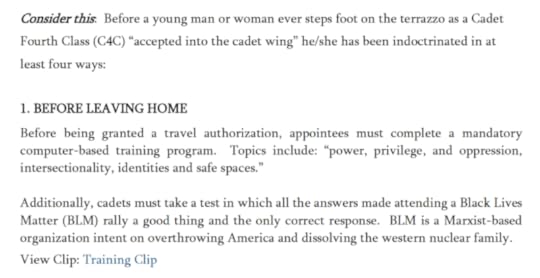
(Here is a link to the Training Clip.)
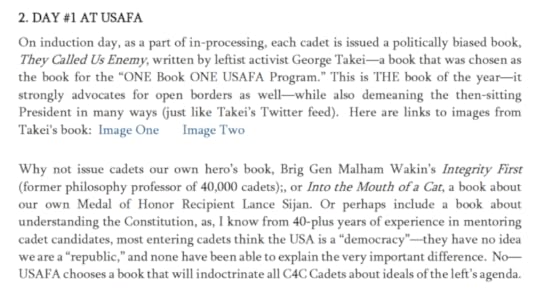
Here are the images from Takei’s book:


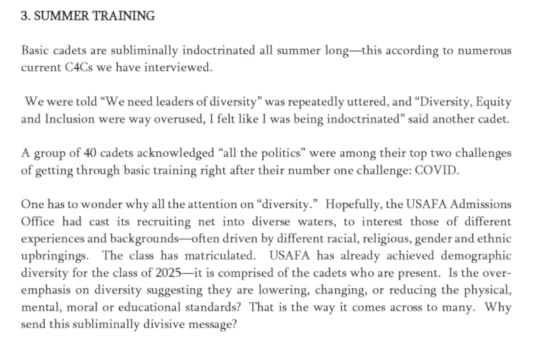

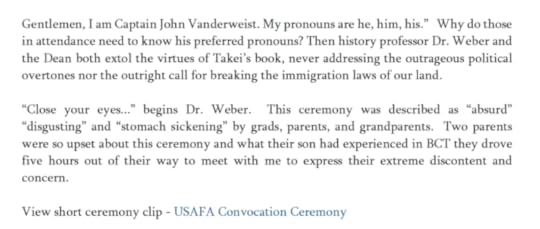
(Link to USAFA Convocation Ceremony.)
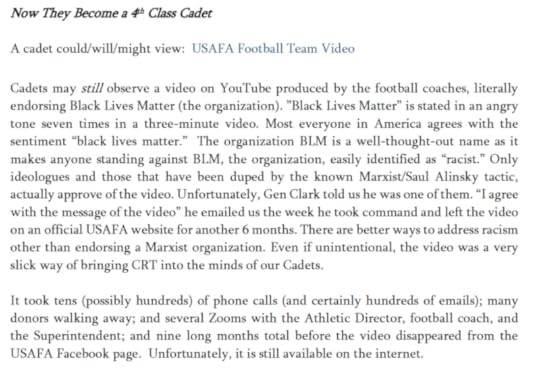
(You will have seen the football team video earlier in this blog post.)

(Here is a link to an article about the Air Force Academy “safe space”.)
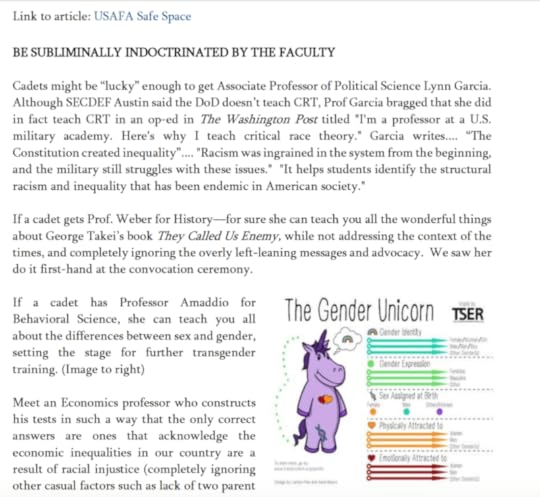
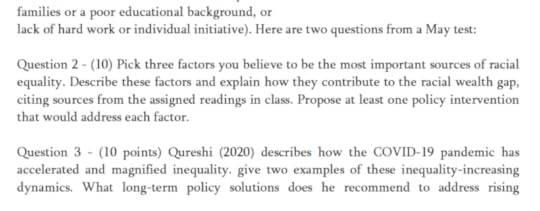
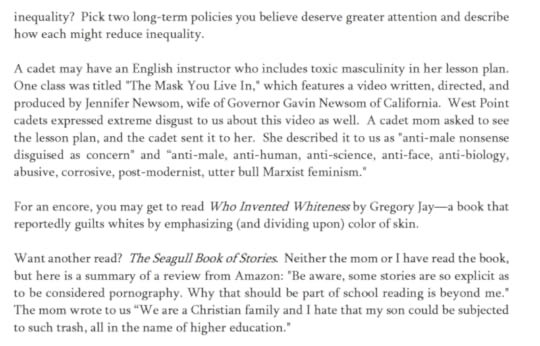
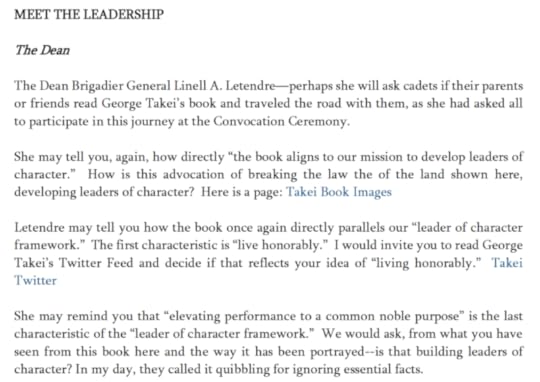
Here are the Takei book images referenced above:

And here is a link to Takei’s Twitter feed.
More:
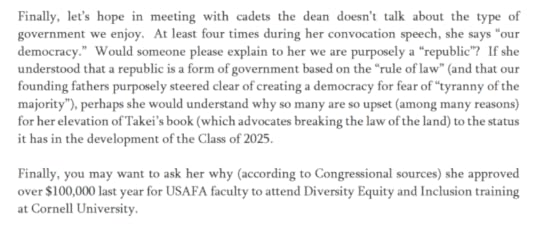
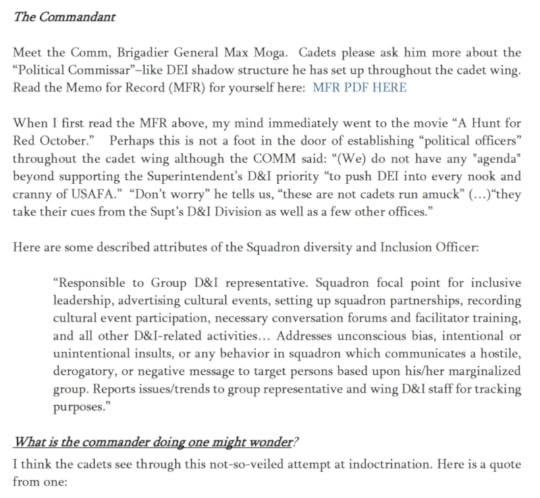
(The Commandant’s Memo For Record can be read here.)
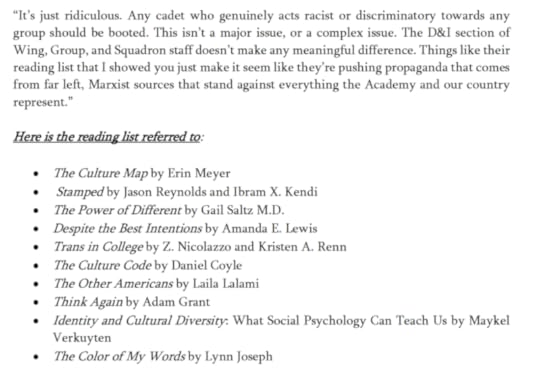
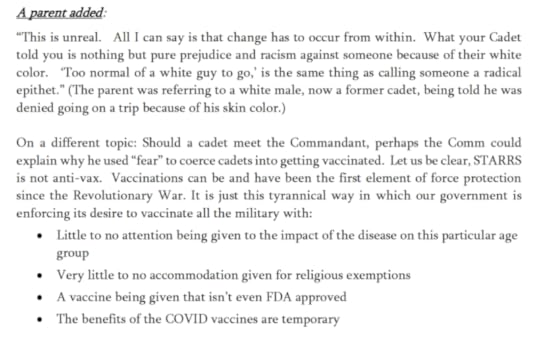
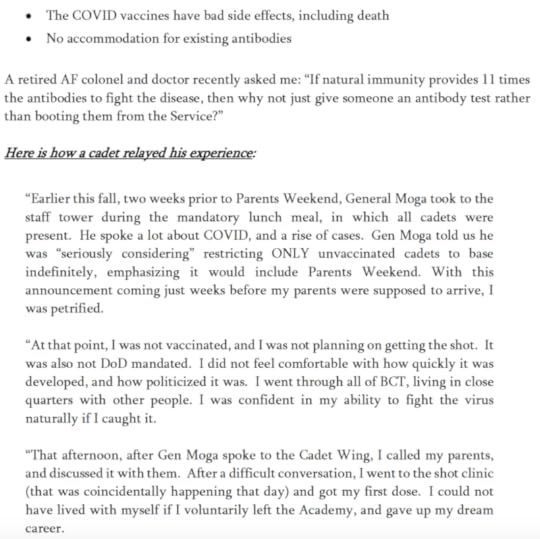
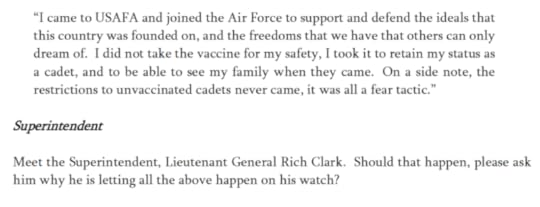

(Here is a link to that Fox News video.)
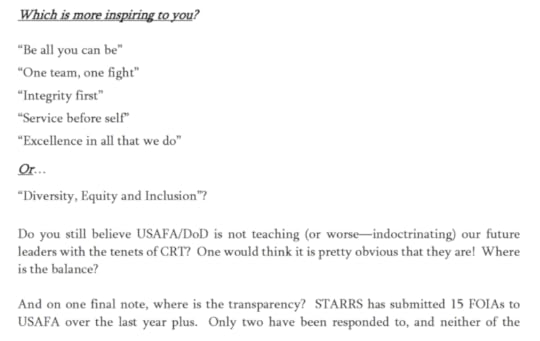

That’s the end of the STARRS letter. If you want to know more about the organization, and to get involved, go to the STAARS website.These men and women are trying to regain the purpose for which the US Air Force Academy, and the US Air Force, exists. The survival of our nation is at stake.
Freddie de Boer is a Marxist, but he is not a fool. If we don’t defeat the woke now, the reaction that will defeat them is going to be terrifying. Happy Thanksgiving.
UPDATE: Reader C.L.H. Daniels with an interesting and probably correct take:
I think you are misreading DeBoer. He is intimating that the real reaction against the moralism of Wokeness, the one that is actually winning and will prevail, is not organized or political or ideological at all, which is why it would be a misnomer to associate it with Douthat’s “Post-Religious Right”, or any other organized or semi-organized political movement. What it is, is simple nihilism (which admittedly is increasingly appearing at the political fringes, both left and right, but then that is surely part of what DeBoer is getting at).
The sheer cynicism of Wokeness combined with late Christianity’s loss of moral authority and perceived hypocrisy is slowly but steadily inuring us against all moral language, and nowhere is this more true than among the young. This is giving rise to a generation that is suffused with a degree of nihilism that is probably unparalleled in our history and represents a very real danger to society. It is important to note that this isn’t exclusively a phenomenon of “the right” however. Indeed, in many ways it is an even more potent phenomenon on “the left”, though neither term is really all that descriptive here. Consider what Joseph Rosenbaum, Anthony Huber and Gaige Grosskreutz were doing out and about in Kenosha the night they got shot. Consider what we know about the lives of those men, because they are exactly the “grinning goblins” that DeBoer is talking about. They were not men of the right, and can probably only be said to be “of the left” to the extent that they were definitely not of the right (which is why those terms aren’t really the ones to use), but what they were in truth was simply nihilists and anarchists (in the lawless sense, not the ideological one). They were there to watch the world burn, and maybe toss a few matches onto the fire themselves.
The country is full of such men. Think about Darrell Brooks, and what we know (or mostly don’t) of his motives. You can try to pigeonhole him into some larger ideology, some set of morally coherent beliefs that might explain why he did it. What you don’t want to consider is that maybe he didn’t have a reason to do what he did. You think a man like him gives a rat’s a** about social justice? You think he’s read Crenshaw or Kendi, or for that matter the Bible? He surely has not. I doubt he even hates white people, not really. If he hates them at all, it’s only as an abstraction, as a personification of the larger forces at work in society that have kicked him around and left him, at 39, a nobody with no purpose and no future apart from putting one foot in front of the other, day after day, for the rest of his life.
I’ve been thinking about why he did it, and the answer that hits me as the most compelling is that he did it for the hell of it. He didn’t plan it ahead of time. He just found himself there, on the parade route, and maybe he was drunk or high or angry after whatever “domestic disturbance” had just occurred (or all of those things), and he said to himself “f*** it, I’m going to drive right through all of this, all of these fake happy people who look down on me, and no one can stop me”. If he’d wanted to kill people from the get go, he could have started hitting them a long way before he did, but he appears to have avoided doing so until it was impossible not to anymore, because the parade and the crowds got too dense. I’m not saying went out of his way to avoid people, but he also didn’t go out of his way to hit them either, not at first. But when he couldn’t avoid them anymore, he kept going anyway, and from then on it seems he may have really been trying to hit as many people as possible. One can almost picture him snarling behind the wheel, full of inchoate rage and aggression, simply not caring about the lives he was taking. It wasn’t personal, it couldn’t have been as he is not known to have known anyone in the parade. They were just in his way. It was sheer nihilistic rage, a monstrous, rage-driven desire to ruin and destroy something, the equivalent of a child throwing a tantrum and ripping the heads off of dolls, only the child was a grown man and the dolls were alive. It was a huge middle finger to the whole world.
Coming back to DeBoer, it is men like these that he is describing. Anarchists and criminals and addicts, men for whom moral language is meaningless, men who don’t care about ideologies and politics, not really. They have no higher purpose. They have no use for “social justice” any more than they do for God and country. They aren’t “right” or “left”. They are full of rage and resentment, directed at anyone and everyone, and most especially at anyone who might try to tell them what to do. They would set anything on fire just to watch it burn, do anything just because someone told them not to. They are destroyers. The cynical moralism of the Woke creates men like these at scale, first by deconstructing any other definition of the good that might give them meaning and bind them to something higher, and then by making itself so cynical and insufferable that it inspires a sort of spiteful revulsion against whatever order it might try to create or preserve. Thus are the jackals set loose to prey on us all. The Woke will eventually themselves fall prey to the disorder they are fomenting. One imagines that they’ve never really stopped to think through what it means to “dismantle systems of oppression” when virtually every important institution in our society is identified as such by those self-same people. As society comes to be an increasingly brutal place, filled with violence and nihilistic despair, they’ll wonder what happened and how it all went so wrong, just as Freddie suggests.
This opposition to Wokism won’t be revolutionary. A revolution implies some sort of higher purpose, a particular goal. The “animal spirits” Freddie is describing have none. He is telling us that what’s coming is moral anarchy. Wokism will simply collapse as large segments of society steadfastly refuse to conform to the moral narratives that the Woke have constructed, and tend to do so in increasingly destructive ways that are impossible to ignore. This won’t be principled opposition, well thought out and organized. It will just be ordinary human viciousness, given increasingly free reign by the moral bankruptcy and illegitimacy of the Woke social order. If Freddie’s right, I expect all kinds of malfeasance to increase. Quite apart from more ordinary crime, there will be more white collar crime, more self-enrichment and self-dealing by elites, more official corruption. Ordinary interactions will turn meaner. I mean come on, you can see all of this happening already. If Freddie is right, our moral order is slowly collapsing, and eventually a cynical and nihilistic populace will turn on the Woke and burn down their temples and kill their sacred cows, but not because they have anything better on offer. They’ll do it out of sheer spite and contempt for the morally bankrupt people presuming to lecture them on their moral failings, and then they’ll dance on the ruins while they turn on each other like starving hyenas. Freddie is betting on the Joker to come out on top.
“You see, their morals, their code, it’s a bad joke. Dropped at the first sign of trouble. They’re only as good as the world allows them to be. I’ll show you. When the chips are down, these… These civilized people, they’ll eat each other. See, I’m not a monster. I’m just ahead of the curve.” – The Joker, from Christopher Nolan’s The Dark Knight
The post STARRS Shining Light On USAF Wokeness appeared first on The American Conservative.
November 22, 2021
Cops: Driver Meant To Mow Down Crowd
Darrell E. Brooks, a 39-year-old Milwaukee man, faces five counts of first-degree intentional homicide after authorities said he drove a red S.U.V. into a Christmas parade on Sunday, killing at least five adults and injuring more than 40 others, including more than a dozen children.
The dead ranged in age from 52 to 81, Dan Thompson, chief of the Waukesha Police Department, told reporters on Monday.
Mr. Brooks steered the S.U.V. through barricades, ignoring the warnings of officers posted to protect the parade, moments after leaving the scene of a domestic disturbance, Chief Thompson said.
The incident was not related to terrorism, and Mr. Brooks was not being pursued by the police at the time, he added. He was captured shortly after speeding away from the scene, according to the chief, who said he was one of the first officers to arrive at the scene.
A police officer fired shots at Mr. Brooks’s vehicle, but “due to the amount of people” at the parade had to stop. No bystanders were struck, Mr. Thompson said.
He was not fleeing a knife fight, as earlier speculation had it. He was not being chased by police. Why did he do it? Why did he drive his car on purpose into a crowd of people at a Christmas parade?
We don’t yet know. But we do know from his social media postings that Darrell “MathBoi Fly” Brooks really hated white people:

And:

Again, this is all circumstantial. We can’t say what motivated Brooks to drive into that crowd of people. Was it anger over the Rittenhouse verdict? We will see. This will become clear in time, I think. But watch, listen, and read carefully to how the media report this unfolding story. A suspect with a record of posting anti-white hatred online plows his SUV into a crowd of what appears to be white people. There might well be no connection between his racial animus and what he did in Waukesha. But we all know perfectly well that if the races were reversed, we would be in media Armageddon now.
By the way, before he pointed his car towards those parade-goers, Brooks was already the scum of the earth. From the NYT:
Darrell E. Brooks Jr., who is accused of driving his maroon 2010 Ford Escape into the Christmas parade in Waukesha, has a long, violent criminal history — and was freed just six days ago on $1,000 bail after being accused of trying to run over his girlfriend with the same S.U.V.
Mr. Brooks, 39, who is from Milwaukee, has been charged with or convicted on an array of charges over the past 22 years, including battery, domestic violence, cocaine possession and resisting arrest in several jurisdictions in Wisconsin.
He has served at least two jail sentences and spent years on probation and in court-mandated work-release and anger management programs, records showed.
On Nov. 2, Mr. Brooks was arrested in Milwaukee after the mother of his child accused him of punching her in the face in a hotel room, then following her in his S.U.V. into the parking lot of a gas station, where he hit her with the car, according to the police.
“Officers observed tire tracks on her left pants leg,” wrote one of the officers, according to a criminal complaint, accompanying a charge of recklessly endangering the woman, which carries a possible sentence of 10 years in prison.
The woman was treated at a hospital for injuries that included facial cuts and bruises. The police observed “swelling on her lip and dried blood on her face.”
Prosecutors agreed to release Mr. Brooks on Nov. 11 for a fraction of the $10,000 bail they initially requested. In a statement on Monday, the Milwaukee district attorney, John T. Chisholm, described the state’s bail recommendation as “inappropriately low” in light of the seriousness of the charges and “not consistent” with office policy.
Only $1,000! Such a racist criminal justice system we have, right? He’s a career criminal and predator who should have been behind bars, not behind a wheel. Here he is explaining his sex offense conviction: he was pimping out a 16-year-old:
clarification on the sex offense. he was pimping out a 16 year oldpic.twitter.com/BkDuu7OtUG
— oak_tree_upheaval (@oaktreeupheaval) November 22, 2021
UPDATE:

The post Cops: Driver Meant To Mow Down Crowd appeared first on The American Conservative.
The World On Fire
News from the world of our very healthy culture, from Carl Trueman:
Another week, another deathwork from a Catholic institution. This time it is Georgetown University. Last week, the university honored military servicemen and women by “queering” Veterans Day. Though the day traditionally commemorates those who have dedicated their lives—often at great, even ultimate, cost—to the service of their country, this event was a “celebration” of queerness. The immediate reason was the tenth anniversary of the repeal of “Don’t Ask, Don’t Tell” and the opening of the military to transgender people. According to the website of the Georgetown University Student Veterans Association, the ceremony involved reflection “on our Jesuit value of cura personalis, care for the whole person, and celebrate our queer sisters, brothers, and siblings.”
That even Veterans Day must be queered is a sign of our times. Pride Month is not enough, at least for the Q in the LGBTQ+ movement. To allow some space, physical or chronological, to remain free of queering would be to grant certain individuals—biological men and women, for example—a legitimacy and stability that queer theory rejects.
This capitulation to the spirit of the age is predictable (I wish I could say “shocking,” but Georgetown is a Jesuit institution, after all). But it is especially sad to see a nominally Christian university positively reveling in this spirit. Of course, this is the same Georgetown that has a community space for students to explore gender and sexuality, something that even the vice president for student affairs has admitted is rather difficult to square with Georgetown’s Catholic mission. That has not kept the president and provost’s offices from officially observing OUTober.
In fact, as any honest reading of the Christian faith would indicate, the notion that human beings can invent their own identities, detach their selves from their bodies, and indulge whatever fantasies they may have about who they are, is simply incompatible with the Bible and the church’s teaching.
Georgetown, of course, is only nominally Catholic, and gets away with what it does because there is no will within the Catholic leadership to “defend the brand,” so to speak. If you send your Catholic kid to Georgetown, you’d better pray hard that this Jesuit college doesn’t unwind their faith.
Georgetown doesn’t worship the Holy Spirit, but the Spirit of the Age: an era of total confusion in which the most culturally powerful forces commit themselves to negating every normative ordering of the world, in the name of liberation — and specifically, sexual liberation, and even more specifically, homosexuality. Homosexuality we have always had with us. What we have never had, as far as I know, is a culture in which the queer sensibility — that is, the desire to overturn order, especially sexual order, and to bring about, as Nietzsche put it, the “revaluation of all values” to extol what until yesterday was abnormal, and to stigmatize what is normal — has driven the culture’s leaders.
This piece from this past summer is funny, but not really:
It was April 2020 when a small group of friends, colleagues, and activists representing very diverse backgrounds and driven by different motivations found themselves wondering the same question: why are queer issues almost invisible in the Arctic? It was this simple question that brought us together with the ambitious goal of finding answers and taking action to make the “invisible” a bit more visible. What was initially convened as a meeting to discuss an Arctic conference proposal planned in the Fall of 2020 – postponed due to the ongoing pandemic – became a venue to raise awareness for queer people and their communities across time and space in the Arctic.
Over the last centuries, state policies and social norms in many societies, combined with colonial hegemonies over Arctic Indigenous peoples, have led to discrimination and stigmatization of individuals, households, and communities that for a variety of reasons do not comply, or do not want to comply, with mainstream heteronormative expectations and lifeways. These currents have also led to the loss or neglect of Indigenous concepts of gender and sexuality. In fact, Indigenous concepts of gender and sexuality were frequently exoticized and described as deviant in anthropological research at least until the 1960s.
If we define privilege as the absence of obstacles in pursuing interests, goals or careers, then the inequalities some individuals face become increasingly evident. Activists, including Indigenous activists, human rights organizations, academics and others have worked hard for the advancement and recognition of equal rights for LGBTQI2S+ communities in the Arctic, but discrimination based on sexuality and gender identity still deeply affect the people living in the region, including Indigenous and non-Indigenous peoples, researchers and visitors.
“Queering” the Arctic? Academics studying and celebrating queer Eskimos? Gosh, why not? Everything else is queer.
Ours is a revolutionary epoch. The disorder is profound, and it is spreading. This desire to queer everything is a manifestation of the collapse of internal order and normativity. This morning, my podcasting colleague Kale Zelden and I recorded an episode with Carl Trueman, in which Carl mentioned that queer theory is “the most honest” of all the critical theories, because it openly admits that it seeks to overturn all settled categories. (That podcast episode of The General Eclectic will be out later this week.) Towards the end, Carl said that perhaps the most important work of our time is recovering a sense of sacred order. If it does not exist, then we are doomed to live in this liquid world, until order reasserts itself (as it inevitably will — but only after an immense amount of destruction). I told him that this is the thrust of the book project I’m about to start.
I cannot recommend Carl’s most recent book — The Rise And Triumph of the Modern Self — strongly enough. If you have struggled to understand the chaos and auto-destruction of our civilization, this book is the key. In today’s podcast interview, I quoted Solzhenitsyn, from his 1983 Templeton Prize address:

We have descended much further than Solzhenitsyn could have imagined. And to this point, most of the Christian church remains quiet, and either afraid to speak up, or preparing itself for capitulation. In today’s interview, Trueman said, “The church is full of people who will find ten righteous reasons not to do the right thing.” Very, very true. The church also has people who are under the illusion that the primary, or even the only, response should be political. We absolutely should have a political response, but the idea that we are going to vote our way out of this mess is delusional — especially given how the acid bath of liquid modernity is collapsing standards and categories in the hearts and minds of individuals.
Kale sent me this Neil Shenvi book review essay about how critical theories are eviscerating the Evangelical mind today. Excerpt:
If the impossibility of disagreement is troubling, the far-reaching implications of these books’ arguments should be even more so. One might naïvely assume that their only goal is self-reflection and the narrow re-examination of particular points of doctrine. That is untrue, however, for two reasons.
First, in keeping with an intersectional framework, these books view white supremacy, patriarchy, heterosexism, and nationalism as mutually reinforcing and interlocking systems of oppression that can’t easily be disentangled, leading to phrases like “white evangelical patriarchy” or “white Christian nationalism.” For example, Barr explicitly cites Tisby’s comments on racism to elucidate sexism: “Jemar Tisby writes ‘racism never goes away. It just adapts.’ The same is true of patriarchy. Like racism, patriarchy is a shapeshifter — conforming to each new era, looking as if it had always belonged” (Barr, MBW, p. 186). Whitehead and Perry write that Christian nationalism “glorifies the patriarchal, heterosexual family as not only God’s biblical standard, but the cornerstone of all thriving civilizations.” Jones asks: “What if . . . conceptions of marriage and family, of biblical inerrancy, or even the concept of having a personal relationship with Jesus developed as they did because they were useful tools for reinforcing white dominance?” And in an incredibly revealing passage, Du Mez writes:
Within this expanding [evangelical] network, differences . . . could be smoothed over in the interest of promoting ‘watershed issues’ like complementarianism, the prohibition of homosexuality, the existence of hell, and substitutionary atonement . . . . Evangelicals who offered competing visions of sexuality, gender, or the existence of hell found themselves excluded from conferences and associations, and their writings banned from popular evangelical bookstores and distribution channels.
In all these passages (and many more I could cite), we find that the authors view their concerns as one part of a larger and seamless liberatory project. They are not merely aiming to challenge racism or specific interpretations of gender roles, but our understanding of marriage, sexuality, hell, inerrancy, and the gospel itself.
Second, these authors’ “deconstructive” approach to theology is necessarily a universal acid. Even if they weren’t explicitly committed to challenging evangelical doctrine broadly, their methodological approach makes such an outcome inevitable. This erosion is, perhaps, one of my greatest fears. I worry that pastors will embrace these books thinking that their application can be confined to, say, race alone. But once a white pastor endorses the view that he — as a white male — is blinded by his own white supremacy, unable to properly understand relevant biblical principles due to his social location, and in need of the “lived experience” of oppressed minorities to guide him, how long before someone in his congregation applies the same reasoning to his beliefs about gender? Or sexuality? At some point, he will have to reverse course and (correctly) insist that although he, like all of us, has blind spots and biases that will distort his understanding of Scripture, nonetheless it is to Scripture — properly interpreted — that we must appeal as our final authority on these issues.
In Nashville, someone I met showed me slides from teacher training in the city’s public schools, in which teachers were taught about the necessity to queer education, to make schools affirming places for the genderqueer, and how to deceive uncooperative parents, who are construed as the enemy. This is not Boston or San Francisco; this is Nashville. And yet, as our group discussed, Christians remain largely docile and accepting — or if they’re not accepting, then they console themselves with the false idea that if we elect a better school board, all this will stop. Well, we SHOULD elect a better school board! But these destructive ideas are thoroughly mainstream in the culture, and we cannot think that regaining some control over our schools — as necessary as that is — will be a sufficient response. Besides, as the Shenvi essay points out, if you accept the critical theory framework, it is impossible to keep it confined to race. It is the universal solvent of all hierarchies and standards of meaning.
This is happening right now. As Carl points out, technology has made it impossible to escape this. Over the weekend spent with some friends in Alabama, we were talking about the Metaverse concept, and how the masses are being conditioned to accept a false but pleasing facsimile of reality over reality itself. You can easily imagine a totalitarian regime keeping most people anesthetized with virtual reality technology, including VR porn, such that they are satisfied to live in this virtual world, receiving their monthly government check, while never getting off the couch. If you have a society in which people believe there is no such thing as ultimate meaning, and that the good life is the life that makes you feel good, then why not?
This culture of death is where the queering of everything is leading. This is where the universal application of critical theory under conditions of technopoly is taking us. Where is the resistance? Where? Don’t people see that the world is on fire?!
UPDATE: Look at the class of people who lead us:
Toronto District School Board superintendent vetoes student book event with Yazidi activist and Nobel Peace Prize laureate Nadia Murad because her memoir about being captured and sexually enslaved by Islamic State terrorists “would foster Islamophobia.”https://t.co/2hJIkCumB0
— Hillel Neuer (@HillelNeuer) November 21, 2021
About the Kyle Rittenhouse verdict, some of our institutions of higher learning are upset that the jury reached the politically incorrect verdict. Here’s some guidance from Douglas M. Haynes, Vice Chancellor for Equity, Diversity and Inclusion and Chief Diversity Officer at University of California Irvine:
The trial of Kyle Rittenhouse versus the State of Wisconsin concluded earlier today. The jury returned not guilty on all five counts of the original indictment (a sixth count was previously dismissed by the judge), including the murder of two people and the wounding of a third on August 25 in Kenosha, Wisconsin. The relief of the Rittenhouse family in this verdict was met by the heavy burden of the families mourning the absence of loved ones and the continuing trauma of the lone survivor.
The conclusion of this trial does not end the reckoning about systemic racism in the United States. If anything, it has simply made it more legible. Kyle Rittenhouse did not live in Wisconsin, but in Antioch, Illinois. He traveled to Kenosha during protests against police violence in the wake of the shooting of Jacob Blake while in police custody. Blake was shot seven times in the back. The Kenosha event continued protests in response to the killings of George Floyd on May 25, 2020 in Minneapolis and Breonna Taylor in St. Louis on March 13, 2020 in Louisville. These multi-racial protests were grounded in a call for racial justice and the end of police brutality. Rittenhouse imposed himself on the protests in Kenosha. His assistance was not requested. It was as much about resisting the calls of protestors as it was to defend property and render first aid.
For this reason, the verdict conveys a chilling message: Neither Black lives nor those of their allies’ matter.
UCI will continue its whole university approach to recognizing and responding to anti-Blackness as an existential threat to our mission as a public research university. Learn more on the UCI Black Thriving Initiative website.
Got that? This powerful university bureaucrat expresses the university’s view that the outcome of a trial halfway across the country was racist. He pays not the slightest attention to the facts that emerged in the trial. For Vice Chancellor Haynes, there was only one possible just outcome. Apparently the purpose of trials is not to determine an individual’s guilt or innocence, but to reassert political mythology. In this case too, it is reasonable to assume that Prof. Haynes is sending a warning shot to anyone in the university community that dissenting from his take on the Rittenhouse verdict might be viewed by the university as a racist act.
If you were at student, professor, or staffer at UC-Irvine, would you feel at liberty to speak out in favor of the jury’s verdict, or would you keep your mouth shut out of fear of being brought to Judge Haynes’s kangaroo court on charges of bigotry?
Meanwhile, this went out to law students at the University of Kansas:
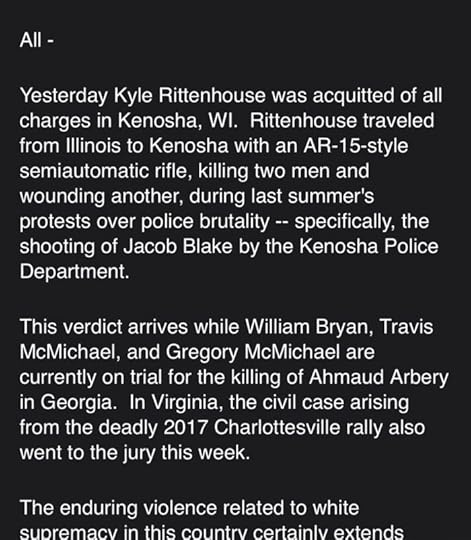
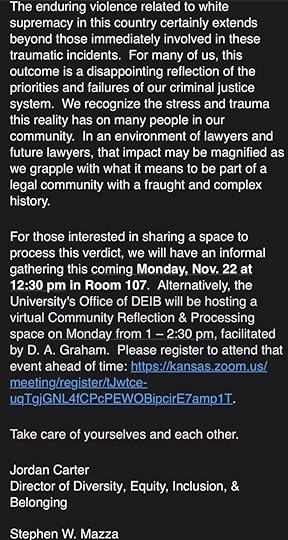
Law students are supposedly unable to “process” the verdict in a criminal trial, without professional help. And they are directed by the diversity commissar AT A LAW SCHOOL to think that the verdict was a racist miscarriage of justice.
These people, our leaders, are building a system that will send people to prison for being the wrong color. I thought we had done a lot to put that kind of wicked system behind us.
What this is all leading to — all of the things I write about in this post, and more — is a crisis of legitimacy for our system. Over the weekend, I heard anecdotally from several people, both in person and in e-mail, that the warnings from enlisted soldiers, sailors, and airmen about staying away from the New Woke Military are amping up. People are starting to wonder if this baizuocracy is worth sacrificing for.
The post The World On Fire appeared first on The American Conservative.
November 19, 2021
Kyle Rittenhouse Walks. Justice Is Served
I have been traveling all day, and am only just now able to post something about the Rittenhouse verdict. I’m going to keep it short, because I’m really tired, and besides, you who have been online or watching TV have probably had as much of the commentary as you can stand. I do want to post this so you can discuss it in the comments.
Here is the video of the young man receiving the verdict:
I’m grateful that the jury returned this verdict, and that kid’s nightmare can begin to end. I’ve been catching up on the media reactions today, and though I am not surprised by the malicious insanity on the Left, I am nonetheless more convinced than ever that the media and Democratic Party people are going to end up stoking racial violence. Tucker Carlson is right:
It is hard to believe, but truth can still prevail in this country over the monstrous progressive lying machine. Despite the best efforts of the media, it turns out that you can’t always ruin a person because you hate the color of their skin and their politics.
My TAC colleague Declan Leary has a sulfuric column about all this. I really like this graf:
The great tragedy of Kenosha is that, in a matter of days, civilization collapsed so fully that the only people willing to stand against chaos were teenagers and twenty-somethings who barely knew how to shoot, much less how to fight, and not at all how to establish or maintain control. That is the reason people died, and the reason Kyle Rittenhouse will spend the rest of his life with the weight of having killed them: the wholesale dereliction of basic duty by an ineffectual government, and the inability of the whole society to form men as capable as they are willing to step into the breach. Once the regime finally crawled out of its bunker, with whole sections of the city turned to ash, the best it could manage was to send some effeminate mediocrity to prosecute the youngest of the LARPers for killing a pedophile and a wife-beater in ham-fisted self-defense.
The post Kyle Rittenhouse Walks. Justice Is Served appeared first on The American Conservative.
November 18, 2021
David Brooks Among The National Conservatives
At the National Conservatism conference in Orlando recently, I ran into my pal David Brooks. I was surprised to see him there. That wasn’t his crowd. He told me that he was writing about it for The Atlantic. Well, the piece is out today, and it’s about what you would expect, given David’s sensibilities and beliefs. The piece has good stuff, but also draws conclusions that I think are wrong. Here’s how the piece begins:
Rachel Bovard is one of the thousands of smart young Americans who flock to Washington each year to make a difference. She’s worked in the House and Senate for Republicans Rand Paul, Pat Toomey, and Mike Lee, was listed among the “Most Influential Women in Washington Under 35” by National Journal, did a stint at the Heritage Foundation, and is now policy director of the Conservative Partnership Institute, whose mission is to train, equip, and unify the conservative movement. She’s bright, cheerful, and funny, and has a side hustle as a sommelier. And, like most young people, she has absorbed the dominant ideas of her peer group.
One of the ideas she’s absorbed is that the conservatives who came before her were insufferably naive. They thought liberals and conservatives both want what’s best for America, disagreeing only on how to get there. But that’s not true, she believes. “Woke elites—increasingly the mainstream left of this country—do not want what we want,” she told the National Conservatism Conference, which was held earlier this month in a bland hotel alongside theme parks in Orlando. “What they want is to destroy us,” she said. “Not only will they use every power at their disposal to achieve their goal,” but they’ve already been doing it for years “by dominating every cultural, intellectual, and political institution.”
As she says this, the dozens of young people in her breakout session begin to vibrate in their seats. Ripples of head nodding are visible from where I sit in the back. These are the rising talents of the right—the Heritage Foundation junior staff, the Ivy League grads, the intellectual Catholics and the Orthodox Jews who have been studying Hobbes and de Tocqueville at the various young conservative fellowship programs that stretch along Acela-land. In the hallway before watching Bovard’s speech, I bumped into one of my former Yale students, who is now at McKinsey.
Bovard has the place rocking, training her sights on the true enemies, the left-wing elite: a “totalitarian cult of billionaires and bureaucrats, of privilege perpetuated by bullying, empowered by the most sophisticated surveillance and communications technologies in history, and limited only by the scruples of people who arrest rape victims’ fathers, declare math to be white supremacist, finance ethnic cleansing in western China, and who partied, a mile high, on Jeffrey Epstein’s Lolita Express.”
The atmosphere is electric. She’s giving the best synopsis of national conservatism I’ve heard at the conference we’re attending—and with flair! Progressives pretend to be the oppressed ones, she tells the crowd, “but in reality, it’s just an old boys’ club, another frat house for entitled rich kids contrived to perpetuate their unearned privilege. It’s Skull and Bones for gender-studies majors!” She finishes to a rousing ovation. People leap to their feet.
I have the sinking sensation that the thunderous sound I’m hearing is the future of the Republican Party.
Well, look, Bovard’s rhetoric here is not necessarily to my taste, but I mostly agree with her take, as David Brooks portrays her. I was a late arrival at NatCon, having been caught in the American Airlines flight cancellation debacle that weekend, so I missed most speeches, including Bovard’s. I’m only going on Brooks’s descriptions of them. If you were there, and heard something different, by all means correct me.
Brooks says there were three kinds of people at NatCon: conservative intellectuals over the age of 50 who have been mugged by wokeness, politicians (Cruz, Hawley, Rubio) who are trying to figure out how to adapt to this new populist era, and:
The third and largest strain is the young. They grew up in the era of Facebook and MSNBC and identity politics. They went to colleges smothered by progressive sermonizing. And they reacted by running in the other direction. I disagreed with two-thirds of what I heard at this conference, but I couldn’t quite suppress the disturbing voice in my head saying, “If you were 22, maybe you’d be here too.”
Brooks goes on:
The information age is transforming the American right. Conservatives have always inveighed against the cultural elite—the media, the universities, Hollywood. But in the Information Age, the purveyors of culture are now corporate titans. In this economy, the dominant means of economic production are cultural production. Corporate behemoths are cultural behemoths. The national conservatives thus describe a world in which the corporate elite, the media elite, the political elite, and the academic elite have all coagulated into one axis of evil, dominating every institution and controlling the channels of thought.
He’s overstating this a bit, but not by much. It’s what I believe — and I believe it because the evidence for it is overwhelming. I can’t for the life of me understand how an observer as acute as David Brooks can miss this. I know that David is more progressive on questions of race and sexuality than most conservatives, so perhaps he is less sensitive to this stuff than many of us. If you don’t see this as a serious problem, naturally the reaction of the NatCon conservatives is going to seem disproportionate.
I am working on a piece now about woke corruption of a major US institution, coming through the radicalization of the institution’s leadership. I have documents and videos. It is jaw-dropping stuff. And this is the sort of thing that happens in many places! Just now, I saw this interview clip from Joe Rogan in which a physician talks about the dean of a medical school asking a urologist — a urologist! — not to use the word “penis” in her lecture. (The video is NSFW because Rogan drops the f-bomb at the end):
While talking with Joe Rogan, Dr. Peter Attia tells a story about woke ideology in a medical school Urology lecture. It’s remarkable. pic.twitter.com/mftjjNZww1
— Mythinformed MKE (@MythinformedMKE) November 18, 2021
Similarly — again, this is just from my Twitter feed in a narrow slice of time this morning — the great Abigail Shrier reports on clandestine indoctrination on gender ideology carried out by woke California schoolteachers. Excerpts:
Last month, the California Teachers Association (CTA) held a conference advising teachers on best practices for subverting parents, conservative communities and school principals on issues of gender identity and sexual orientation. Speakers went so far as to tout their surveillance of students’ Google searches, internet activity, and hallway conversations in order to target sixth graders for personal invitations to LGBTQ clubs, while actively concealing these clubs’ membership rolls from participants’ parents.
Documents and audio files recently sent to me, and authenticated by three conference participants, permitted a rare insight into the CTA’s sold-out event in Palm Springs, held from October 29-31, 2021. The “2021 LGBTQ+ Issues Conference, Beyond the Binary: Identity & Imagining Possibilities,” provided best practices workshops that encouraged teachers to “have the courage to create a safe environment that fosters bravery to explore sexual orientation, gender identity and expression,” according to the precis of a talk given by fifth grade teacher, C. Scott Miller.
Several of the workshops advised teachers on the creation of middle school LGBTQ clubs (commonly known as “Gay-Straight Alliance” clubs or “GSA”). One workshop—“Queering in the Middle”—focused “on what practices have worked for successful middle school GSAs and children at this age developmentally.”
More:
On the audio recording, Baraki and Caldeira explain that they give an anti-bullying school presentation every year. “Let me assure you that the presentation that we gave was 100 percent age appropriate. Literally, definitions: ‘If someone is gay, it is a man who is attracted to another man.’ Right? ‘If somebody is a lesbian, it is a female attracted to another female.’ Literally, gave them definitions. We also covered religious differences, race, cultural backgrounds, family status poverty—everything that is listed in the Parents’ Rights handbook, we covered. That is not what kids went home and told their parents, though,” Caldeira said.
There was parent backlash; Caldeira and Baraki learned from the experience: “Next year, we’re going to do just a little mind-trick on our sixth graders. They were last to go through this presentation and the gender stuff was the last thing we talked about. So next year, they’ll be going first with this presentation and the gender stuff will be the first thing they are about. Hopefully to mitigate, you know, these kind of responses, right?” Baraki can be heard telling the teacher audience. Parents who oppose this material being taught to their sixth graders will find that their objections arrive too late.
A conference attendee told me that Baraki then directed the participants’ attention to a parent email objecting to the presentation. The parent had written that she had not intended to have a conversation with her middle schooler about sexual orientation and gender identity, but the school presentation forced her hand. Baraki mocked the parent to her audience: “I know, so sad, right? Sorry for you, you had to do something hard! Honestly, your twelve-year-old probably knew all that, right?”
One parent objected so strenuously that the principal “invited them to take their child to a private school that more aligns with them,” Caldeira can be heard to say. “So that was a win, right? We count that as a win.” Then, Caldeira added: “Plus, I hate to say this, but thank you CTA—but I have tenure! You can’t fire me for running a GSA. And so, you can be mad, but you can’t fire me for it. CTA has made it very clear that they are devoted to human rights and equity. They provide us with these sources, these resources and tools.”
There’s plenty more, so read it all. Shrier has the documents and audio clips provided by a whistleblower.
The inability or the refusal for mainstream media figures to recognize this stuff is happening everywhere, and to grasp why it infuriates parents and destroys trust in institutions (like schools, and like newspapers and magazines that won’t report it), has a lot to do with the anger Brooks saw at NatCon.
This from Brooks identifies the core ideological conflict at NatCon:
Some of the speakers at the conference were in fact classical liberals, who believe in free speech, intellectual debate, and neutral government. Glenn Loury gave an impassioned speech against cancel culture, the illiberal left, and the hyper-racialized group consciousness that divides people into opposing racial camps. Loury asserted that as a Black man he is the proud inheritor of the great Western tradition: “Tolstoy is mine! Dickens is mine! Milton, Marx, and Einstein are mine!” He declared that his people are Black, but also proudly American. “Our Americanness is much more important than our Blackness,” he said, before adding, “We must strive to transcend racial particularism and stress universality and commonality as Americans.” This is the classical-liberal case against racial separatism and in favor of integration.
But others argued that this sort of liberalism is a luxury we cannot afford. The country is under assault from a Marxist oligarchy that wants to impose its own pseudo-religious doctrine. If you try to repulse that with pallid liberalism, with weak calls for free speech and tolerance, you’ll end up getting run over by those who possess fanatical zeal, economic power, and cultural might.
And, after quoting my talk about Viktor Orban, the democratically elected prime minister of Hungary, and how he has legally used the power of the state to push back against left-liberal power centers, Brooks writes:
This is national conservatism pursued to its logical conclusion: using state power to break up and humble the big corporations and to push back against coastal cultural values. The culture war merges with the economic-class war—and a new right emerges in which an intellectual cadre, the national conservatives, rallies the proletarian masses against the cultural/corporate elites. All your grandparents’ political categories get scrambled along the way.
That’s a pretty good summary of what NatCon is after. Here’s an excerpt of Brooks’s summary critique:
The NatCons are wrong to think there is a unified thing called “the left” that hates America. This is just the apocalyptic menace many of them had to invent in order to justify their decision to vote for Donald Trump.
They are wrong, too, to think there is a wokeist Anschluss taking over all the institutions of American life. For people who spend so much time railing about the evils of social media, they sure seem to spend an awful lot of their lives on Twitter. Ninety percent of their discourse is about the discourse. Anecdotalism was also rampant at the conference—generalizing from three anecdotes about people who got canceled to conclude that all of American life is a woke hellscape. They need to get out more.
Furthermore, if Hazony thinks America is about to return to Christian dominance, he’s living in 1956. Evangelical Christianity has lost many millions of believers across recent decades. Secularism is surging, and white Christianity is shrinking into a rump presence in American life. America is becoming more religiously diverse every day. Christians are in no position to impose their values—regarding same-sex marriage or anything else—on the public square. Self-aware Christians know this.
Finally, there is something extremely off-putting about the NatCon public pose. In person, as I say, I find many of them charming, warm, and friendly. But their public posture is dominated by the psychology of threat and menace. If there was one expression of sympathy, kindness, or grace uttered from the podium in Orlando, I did not hear it. But I did hear callousness, invocations of combat, and whiffs of brutality.
You know, or should know, that I love and respect David, but I think he is seriously mistaken here (except about the return to Christian dominance thing; unfortunately, that’s true). Again, I simply can’t comprehend the view that the woke Left, especially its stranglehold on elite institutions and networks, is largely a phantom. If David wants more anecdotes, he should read my in-box, as I hear constantly from people within all kinds of institutions who are dealing with this. Maybe he’s like proverbial frog who has been boiled too slowly to notice. I imagine that if you live in the Acela corridor, and socialize with professional elites there, you have already absorbed a lot of the woke ideas that so anger and horrify many of us.
I don’t know. I can’t read my friend’s mind, and I hope to talk to him about it sometime. I think, though, that there is a certain kind of American who genuinely — that is, without trying to be unfair — cannot comprehend what non-elites, or outsider elites like many at NatCon, are seeing. Or to be more precise, they can’t comprehend the alarm over it.
I mean, look, this is a tiny thing:
For #TransAwarenessWeek, we want to make the world more inclusive, so we’re releasing a book with our friend Nick North about the importance of using pronouns. Available on November 20th with proceeds going to @RainbowRailroad. pic.twitter.com/4jSW4abj9h
— KRAFT Peanut Butter (@KraftPB) November 15, 2021
Tiny, but for this: why the hell should parents have to deal with a consumer brand propagandizing their children to doubt their masculinity and femininity? You could say: “Hey, don’t buy Kraft peanut butter.” Which is one response. But the broader point is that woke ideology is now in the air we breathe, and it attacks families via schools, via woke capitalism, even via woke peanut butter sandwiches. Again, this is a very small thing, but it symbolizes something much larger. To urbanites like David, it might seem like we are being unkind and uncaring about gender dysphoric kids. But to us, we are freaked out that this damn corporation has taken it upon itself to mess with our children’s heads on matters of sex and gender identity.
I do somewhat agree with David on the public posture — something that people have said about me before: that in person, I am charming and friendly, but in my public rhetoric, I am combative and alarmist. In my own case, I am so alarmist because a) I think there really are things worth being alarmed over, and b) because in a world where people are deaf, you have to shout to be heard. I’m guessing David hasn’t read Live Not By Lies, because its very premise no doubt strikes him as wildly overheated. I have mentioned here before that the book has sold very well, despite no mainstream media coverage, because it has had such good word of mouth. I was out in Colorado Springs yesterday taping some interviews at Focus On The Family, and I heard about the book the same thing I hear about it from people all over: that it explained what they have been dealing with in their own families, institutions, churches, social spheres, etc.
There is this really big thing happening in our country, and quite a number of journalists working for the leading news organizations are trying hard not to notice. It is interesting, as Brooks observed, that NatCon is divided between people who still identify in some sense with the classical liberal tradition, but who want to see it reformed, and those who want to trash the whole thing. I identify with the former, uneasily, but only because I can’t (yet) see a potential replacement that would have a chance of succeeding, and that would be so much better that it would be worth surrendering what we have. It would be nice if the two sides could talk to each other, and learn from each other, but that’s not what the burn-it-all-down side seems to want.
A much better piece of analysis about the NatCon world was Tanner Greer’s long essay from April about “the problem of the New Right”. Excerpt:
There is no New Right catechism. Each man of the New Right has his unique obsessions. Yet there is a broad set of shared attitudes and policy prescriptions that draw New Righters in. The New Right likes to think of itself as a band of class warriors. Of tariffs and industrial policy, they are unequivocally in favor. Government economic intervention is to be lauded, if such intervention revitalizes the heartland and secures the dignity of the working-class man. Both tech companies and high finance are viewed with suspicion. New Right figures are the conservatives most likely to be calling for Section 230 reform and least likely to care about corporate tax rates. The New Right distrusts capital.
This is partly because capital has become woke, but there are deeper concerns: the New Right is a response to the loss of a way of life (or an imagined way of life, for the New Right’s younger legions have never experienced personally what they yearn for), and when they survey the causes of heartland malaise (the horrors of the opioid crisis, the despondency of the deindustrialized boomtown, and so forth) everywhere they find the wicked hand of avarice. They believe that America’s corporate class has subverted American culture and betrayed the American people. The problem with financiers, they say, is that they have no roots. The financier is a flighty being who cares for nothing but lucre. He will follow the gold-laced trail wherever on the globe it might take him.
“Globalist” is the favorite epithet for the New Right’s enemies. They hate meritocratic climbers whose motives and mores mirror those of urban professionals in London or Singapore, not those of “normal” Americans in Chattanooga or Cleveland. The fantastic rise of Chinese power is the most dramatic proof of the greed, hubris, and disloyalty of this globalized class. If the New Right type is hawkish at all, it will be hawkish on China (though for many their hawkishness has less to do with animus towards Chinese communism than in their hope that that economic and technological competition with Beijing will force Washington into the sort of reforms they seek). Otherwise, the New Right is against foreign adventuring. They admit the last thirty years of geopoliticking were a disaster; they want no more wars in the Middle East. They see those wars as an outgrowth of liberal internationalism, itself a bloody bastard-child of the dominant liberal ideology at home. This ideology is just as dangerous to the American people as America’s traitorous elites. The New Right’s first war is against ideas.
All true, I think — and there’s more. Greer has a pretty good handle on the strands of thought that make up the New Right. Where his article is a real contribution to understanding is when he brings culture into it. He bases his analysis on David Hackett Fischer’s great work Albion’s Seed, about how four distinct English folkways made America. You should read the whole Greer essay, but the gist of his critique is that the things that upset the New Rightists (of whom I am one) are not things that were core to the Founding, but aspects of culture that came over to America with the English colonists. They pre-date the Enlightenment, and have been with us since our beginning. For example:
This is the first problem with the New Right’s proposed post-liberal turn. They might, with Deneen, attack liberalism for “liberating all from the constraint of custom.” In Hungary, Poland, or some other country where liberalism is a foreign import, that charge has merit. But in America? In the United States liberalism is the constraining custom. The folkways that comprise America’s liberal regime are centuries older than America’s liberal constitution. It is not clear to me that commercialism, individualism, and so forth can be excised from the American mind. Short of a massive social engineering project, by what means could this be accomplished?
Take a look at this part, in which Greer points out that there was real, substantive diversity even among the English settler peoples:
Fischer does not study the folkway of the American people but the folkways of the American peoples. His central thesis is that America is, and always has been, a pastiche of nations. Four very separate cultures, with distinct and separate folkways, settled in America. To this day, Fischer maintains, these folkways (though somewhat changed by time and circumstance) shape American politics and society.
One of these four founding cultures were the Puritans of Massachusetts Bay. As my editor friend intuited, the “politics of the common good” that the New Right strives for aligns warmly with the Puritan’s communitarian conceptions of ordered liberty. I will return to these Puritan ideas in a moment, but to understand the challenge that faces the New Right we need to turn to one of America’s other founding nations.
The “backcountry” of the British colonies were settled by Scots-Irish immigrants from the borderlands of England and Scotland. The men and women who survived these war-torn marches did so through cultivating a reputation for savagery. The backcountryman put clan over community. Not for him was the New England township or the small groups of farmsteads that dotted the Delaware River Valley. Instead, backcountrymen spread their farms across the mountainsides, careful to build their cabins miles apart from those closest to them. The backcountryman honored strength and charisma, but had no respect for rank or hierarchy. Authority was weak in his world, and that is how he liked it. He rejected outsiders. He rejected the learning of the university men. The backcounty wrapped its patriotism in the imagery of rattlesnakes, hornet nests, and alligators; they did not invent the phrase “Don’t Tread on Me” but nowhere was it more popular than among America’s Scots-Irish migrants.
Patrick Henry was an early backcountry leader. Fischer’s reflections on Henry and his people’s view of liberty are worth excerpting at length:
The traveler Johan Schoepf was much interested in ideas of law and everybody which he found in the back country. “They shun everything which appears to demand of them law and order, and anything that preaches constraint. Altogether natural freedom is what pleases them.”
…[When] Patrick Henry was a member of the first Continental Congress, he startled that body by arguing that as a result of the passage of Parliament’s Intolerable Acts, “government is dissolved.” Henry insisted that “we are in a state of nature, Sir!” Congressmen from Pennsylvania and Massachusetts were as shocked is Virginia Burgesses had been [when they encountered Henry a decade earlier]. One described Patrick Henry as “in religious matters a saint; But the very devil in politics.”
…Patrick Henry’s ideas of natural Liberty were not learned from treaties of political theory. His idea of a “state of nature” was not the philosophical abstractions that it had been for Locke. Thomas Jefferson said of Patrick Henry with only some exaggeration that he “read nothing, and had no books.” Henry’s lawyer-biographer William Wert wrote, “of the science of law he knew almost nothing, of the practical law he was wholly ignorant. He was not only unable to draw declaration or a plea, but incapable, it is said, of the most common or a simple business of his profession, even the mode of ordering a suit, giving a notice, or making a motion in court.” Patrick Henry’s principles of natural Liberty were drawn from the political folkways of the border culture in which he grew up….
The libertarian phrases and thoughts which echoed so strongly in the back country had earlier been heard in the borders of North Britain. When the back country people celebrated the supremacy of private interests they used the same thoughts and words as William Cotesworth, an English borderer who in 1717 declared “you know how natural it is to pursue private interests even against the darling principle of a more general good.”
See these backcountrymen articulate the same liberal platitudes that the New Right detests! At one point in Liberty and Freedom Fischer even describes their conception of freedom with the words “liberty as individual autonomy.” This conception of freedom was developed without any knowledge of Enlightenment texts. Most of these 18th century pleasure-maximizing, autonomy-seeking egoists could not read.
Reading Greer, I immediately recognized the attitudes of the Scots-Irish who make up a big part of my own Deep South culture. (Interestingly, Fischer also writes about the Cavalier culture of the Tidewater and the Carolinas — a culture that contributed the planter elites in my own West Feliciana Parish. It’s why there’s a big Episcopal parish in West Fel, and nothing like it in East Fel, just across the creek.)
I want you to read the whole thing, but the heart of it is Greer’s conclusion that the New Right theorists (people like Patrick Deneen, Gladden Pappin, and Adrian Vermeule) are like the Puritans (not a slur — this is one of Fischer’s four English folk cultures), with their common good culture. The average Trump voters, though, have the consciousness of the Scots-Irish Borderland people. They aren’t liberal, necessarily, but they are naturally libertarian. One more quote from Greer:
In sociological terms, I suppose the best way to understand the New Right is as Puritan heretics. The Puritans were the most communitarian of Fischer’s four founding nations; their cultural descendants (found in places like Boston and Portland) are the Americans most willing to live for the Holy Cause today. Like the New Right, the left’s modern-day Puritans also lionize the Federalists and Whigs.[19] It makes sense, in a way. Most of the New Right’s leaders either come from or immersed themselves in Puritan milieus. The number of Ivy League degrees claimed by New Right thinkers is one proof of this. That Claremont is based in California—instead of, say, Texas—is another example of the phenomena. Yankee thinking seeps into the thought of those who long swim through it.
About a year ago I met with a young post-liberal who expressed a passionate loathing of everything American. American culture was not home to her. And how could it be? New England born, Ivy-educated, committed to the politics of the “common good” — here was a spiritual descendant of the Puritans if there ever was one. But of course all the other Puritans, whose religion now runs woke, would not have her. She has no place at their table. This outcast was instead forced into the other coalition, the coalition led by the raucous individualists of the backcountry tradition. Enemies of one’s enemies are friends they say, but tactical allies make poor bosom-mates. My post-liberal friend has no choice but to work for the living antitheses of her deepest convictions.
That is the problem of the New Right. I doubt most New Righters feel quite so alienated from the Trumpfolk they lead, but her problem is theirs. Pity the Whig who wishes to lead the Jackson masses! Spare a prayer for the post-liberal politico who must herd the backcountry crowd. The pillars of the New Right’s rising moral order are the most licentious and rebellious people in the nation. This is an unstable foundation for a post-liberal body politic if there ever was one.
I hadn’t realized until I read Greer that what I feel intuitively — that it is going to be very hard to convince Americans, even conservative, populist Americans, to abandon classical liberalism, because in some form, it is sedimented into our cultural bones.
I’ll end with this: as much as I disagree with most of David Brooks’s essay, he makes me realize that we on the broad New Right/National Conservative coalition need to do a better job of talking with conviction about the things we love, as opposed to the things we hate.
UPDATE: I like Richard Hanania’s characterization of Abigail Shrier’s story:
California teacher’s association seeks to make kids gay, upset that they’re not becoming gay enough, lying to their parents and spying on children’s Google searches and conversations to make them gay. https://t.co/yPRMCdFoEa pic.twitter.com/Rl3zOt02UJ
— Richard Hanania (@RichardHanania) November 19, 2021
I am so sick of this shit. I just can’t tell you how sick I am…
The post David Brooks Among The National Conservatives appeared first on The American Conservative.
November 17, 2021
Caesarism From The Post-Liberal Right?
From the latest Patrick Deneen essay:
Consider the positions that the mainstream of American conservatism spends a great deal of its time and treasure defending today:
Religious liberty
“Limited” government
The inviolability of private institutions (e.g., corporations)
Academic Freedom
Constitutional “Originalism”
Free Markets
Free speech and “expression”
Each of these positions was a creation of early modern liberalism, designed to overthrow a predominantly Aristotelian/Thomistic worldview. Each of these liberal features represent an aspect of what Alasdair MacIntyre has called “the privatization of the good.” Each was designed as a battering ram to demolish any prospect for a social, political, and economic order that – while never perfect – nevertheless understood that society must be ordered toward the end of advancing the telos of human beings.
Each of these features of liberalism is contentless, essentially boiling down to an “agreement to disagree.” While conservatives spent several generations decrying the scourges of “relativism,” their position effectively denied objective truth had any claim in the political order. As we have discovered, the challenge from the left is not relativism: they know what they believe, and pursue that goal with fierce and unwavering determination. It’s the defenders of Con. Inc. who are the relativists, promoting a world in which we the individual is the measure of truth.
It is claimed that each feature of liberalism is necessary because of the fact of pluralism. One hears the likes of David French and Rod Dreher invoking “the fact of pluralism” as the impregnable wall that prevents any efforts to enact authoritative law. Yet, they simultaneously bemoan the rise of a monolithic left that has no compunctions about the “fact of pluralism.” If you are a religious believer, too bad. There’s no room for heresy in the Church of American Progressivism. Pluralism is only a problem, an obstacle, and a handcuff for … conservatives.
Well, gosh, I had not heretofore thought myself on the side of David French, whose views I have criticized, and I know that to be a “David Frenchist” is the worst thing in the world to a certain kind of Christian intellectual. But I do think — and I have always said this — that French is correct when he criticizes Sohrab Ahmari and his tribe on practical grounds. I wrote the other day about the moment in the first French-Ahmari debate, in which French, a lawyer, asked Ahmari what he would actually do to stop Drag Queen Story Hour. Ahmari had nothing to offer. I side with Ahmari on the awfulness of DQSH, and if I could pass a law to forbid it, I would.
But this is where it helps to have a lawyer on staff. French tirelessly points out that we would throw out a body of First Amendment jurisprudence that protects Christians for the sake of getting at drag queens, leaving ourselves with nowhere to hide when the mob comes after us. Then what?
The, um, fact remains that pluralism is a fact in this country. The country is, alas, de-Christianizing, and people like Deneen and me are going to be construed as enemies. I don’t see any practical way to fight this in the United States of America but within the liberal constitutional order — because if we overthrow the liberal constitutional order, we conservative Christians will soon find that we are a despised minority that will have nowhere to hide. I don’t like it, but there it is.
The problem with Team Integralist is they are good at picking out the flaws of the liberal order, but as yet have no realistic replacement for it. Pluralism might seem like a phantom to Patrick Deneen, but just try to create a political order based on subjecting the state to Catholic teaching, and see how far that gets you with the actually existing American people. I would be surprised if more than one in ten Catholics would go for it (and Catholics are only 22 percent of the US population).
I get the frustration. I have it myself. I see that the Left has hollowed out all the major institutions of American life, and wears classical liberalism like a skin suit. We live in an increasingly illiberal left-wing regime — and by “regime” I mean the ruling class, not just the state, but also corporations and other non-governmental institutions. I do not see any way to fight that effectively other than on well-established American constitutional grounds. The task is immense, and I don’t know that we can win. But what is the alternative? To create a dreamland polis on paper, but one that has zero chance of coming into existence in the real world, except perhaps through Caesarism. If Caesarism is what Patrick and his friends are after, then they should say so. If not, then they should explain how they intend to bring about their ideal state in a country with the demographic characteristics of ours, given the advanced MacIntyrean condition of disunity at the religious and even metaphysical level.
Team Integralist just wants to wave it away, but the fact that America is a pluralist, historically Protestant, and currently de-Christianizing country is a very big problem for their ideas. Again, if they believe the Founding was a mistake from the get-go, and that it should be overturned and replaced with something else, they should say so. If they don’t, then they should explain how they intend to bring about the changes they desire through the constitutional system that we have. Otherwise, it’s just a Very Online exercise.
Back in 1996, First Things magazine published a very controversial series of essays questioning the validity of the US political order, based on abortion. In the end, I think Father Neuhaus concluded that we should not abandon the constitutional regime until and unless we have exhausted all democratic means of changing the law. What if we applied this policy to our country today? Think of all the things the people fed up with soft totalitarianism could do within the system to fight it!
In atheistic France, a million people marched almost a decade ago to defend the traditional family in the face of gay marriage proposals. In America, which is far more Christian, this did not happen. Why not? If the people are upset about Drag Queen Story Hour — and I agree that we should be — then why not turn out to protest at the local library? The drag queens still retain a constitutional right to use that library — same as Christians — but a sustained and sizable protest would make a powerful statement about what the community values.
There are many, many ways to reign in the free market, and make it work more for the common good, within the current system. Why not let’s try them before we decided that liberal democracy doesn’t work? Activist parents in Virginia, and a brave activist named Chris Rufo, have shown what can be accomplished by angry, engaged parents confronting corrupt progressive authority. Before we abandon the Constitution, let’s try more of this.
As for deciding that religious liberty, free speech, and academic freedom are bad concepts, well, good luck trying to convince most Americans of that. We value religious liberty in this country precisely because the country was founded by religious dissenters. If we don’t have religious liberty, we small-o orthodox Christians are sunk. We are in this crisis today in part because the Left has abandoned these classical liberal values. I completely understand the desire to throw off the ideal of liberalism, and fight them openly from an illiberal Right position — but if you hope to prevail in the inevitable political struggle, you had better have the people on your side. Are the American people really inclined to side with Catholic integralism?
Once again: I agree with Deneen’s criticism of liberalism in his great book Why Liberalism Failed. I don’t have faith that America is going to come out of this crisis intact. But I could be wrong! I hope I am. There are valuable things to learn from that critique. Yet I am not convinced in the least that we on the Right, in post-Christian America, can defend what we value in this actual, existing political order, with a populace that has largely abandoned substantive forms of orthodox Christianity. Aside from revulsion at the more radical versions of race and gender ideology, the United States is not a culturally conservative country. I hate that, but that’s where we are.
You could do it with Caesarism, which is tyranny. Is this what the integralists want? One more time: if it is, then they should say so. If it is not, then they should say why not, and how they intend to get us from this point to what they call a “common good” regime absent coercion. Despite the way they behave, I am not their enemy, but I am not going to quit asking these questions — and it’s not because I have a sinecure within Conservatism, Inc. (I don’t), or am awaiting, in my Baton Rouge subdivision, my invitation to Georgetown cocktail parties. We are in a very, very serious moment in the life of our nation and the churches, and we have to proceed with focus and prudence. If I’m wrong, show me where I’m wrong. Sneering at critics of integralism is not a worthy response.
UPDATE:
The Integralist Door Theorist: A Dialogue
“Hey mister, that front door you have is in pretty bad shape. It’s not going to keep the bad guys out.”
“Yeah, you’re right about that. It’s been bothering me for a while. What do I do?”
“I would take down that door right now. It’s crap.”
“What, and leave my front door wide open? Are you serious?”
“I didn’t say you had to leave it wide open. You need a stronger, better door.”
“I know. So what do you have for me? Are you selling doors?”
“Not as such. Why do you ask?”
“Because you’re telling me that my door is weak and I need to take it down. What are you proposing that I put up instead? I can’t just leave my house wide open.”
“You are operating from a defensive crouch. Is your name David French?”
“What?”
“A defensive crouch! The days of being in a defensive crouch behind flimsy doors are over!”
“Damn right I’m being defensive. I want to defend my house from the bad guys. You are telling me that my front door is in bad shape, and I agree. You are telling me to take it down. You want me to take down weak protection for no protection at all. What sense does that make?”
“There will be a better door, in time, when we learn again how to build doors like they did in the 13th century. Now those were some strong doors!”
“You know, I’ve seen some of them in Europe. They are pretty impressive, the ones with the fancy ironwork. But medieval doors won’t fit on American houses.”
“You have a pint. The door-building in this country has been fatally flawed from the beginning. American doors were never going to amount to much.”
“Maybe so, but American doors is all we have. So what am I supposed to do? You say I need a medieval door, but nobody makes them these days, and they wouldn’t fit any door frames I know of. I would actually like to have a medieval door, but where’s the market for medieval doors going to come from?”
“It’s always about the market with you people. You think the market can solve all problems.”
“Come on, be serious.”
“Well, America needs a sensible leader who orders everybody to install medieval doors. That way, we will have medieval door factories, and everybody will have one, and everybody will be safe and happy.”
“What if nobody wants medieval doors? And like I said, medieval doors don’t fit on American houses. Anyway, what am I supposed to do about the open hole in the front of my house, while I’m waiting on the medieval door I ordered?”
“Why do you keep asking these questions?”
“Because I’m not a theorist of doors. I just need to keep my house safe.”
“John Rawls! Empire of Guadalupe! Wide stance! David French!”
“Hey now, no need to get snippy.”
“I will not be tone-policed!”
“Whatever. Maybe I can put some extra locks on this front door, and put some security lights up. Shouldn’t I at least try to strengthen what I have instead of taking the door down?”
“There you go again, being a frightened retreatist.”
“Oh, come on! You are asking me to take down this beat-up front door and leave my house wide open, and hope that somehow somebody comes along with a better door. Show me the better door, and show me how I’m going to be able to get it secured in place, then I’ll consider your offer. Until then, I’ll stick with the front door I have, not the supposedly better front door that doesn’t exist, except on a rectory somewhere in Normandy. I agree with you that my door is not very strong, but I would be a fool to take it down without knowing what’s going to replace it.”
“Admit it, you’re a door defeatist.”
“This conversation is going nowhere. Goodbye.”
“Coward. But look, before I go – can I interest you in buying a subscription to our Substack? It’s about door theory.”
The post Caesarism From The Post-Liberal Right? appeared first on The American Conservative.
Father Jamie Vs. A Den Of Vipers
Take a look at this lovely tweet by an English cleric:

The poor man was mobbed by fellow Anglican clergy, denouncing him. A sample:



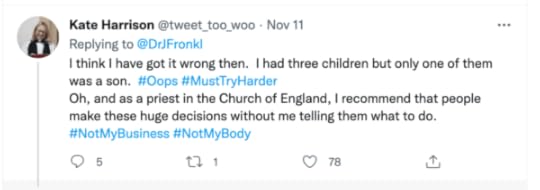



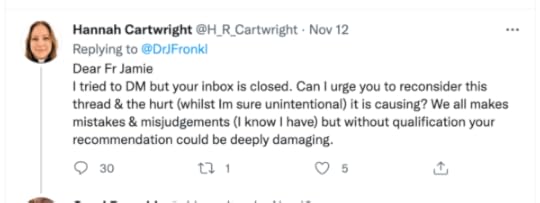
All of the above are from Anglican clergy! My friend Father Daniel French, an orthodox Anglican clergyman, comes to the rescue of a new Christian scandalized by the progressive clergy’s response to Father Jamie:
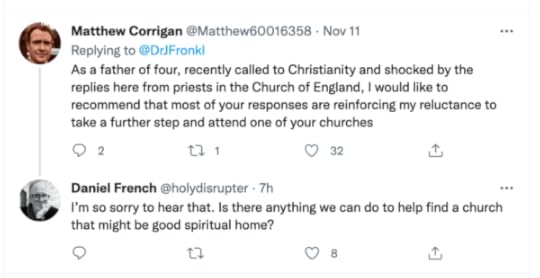
Here’s a link to the Twitter thread, if you want to follow it, or go over and give Father Jamie an attaboy.
Look, a church whose clergy despise families is a church without a future. A church whose clergy pounce on a priest who puts in a good word for childbearing is a sick institution. There are fewer and fewer young people in Anglican churches. According to this column in the Anglican newspaper Church Times:
The Archbishop of York, the Most Revd Stephen Cottrell, called for a younger and more diverse Church on his appointment last year. The facts, though, are stark: in 2018, national Sunday attendance figures for under-16s dropped below 100,000 for the first time. The single-church returns showed that 38 per cent of the 903 churches that responded had no under-16s in their congregation at all, and more than two-thirds (68 per cent) had five people or fewer of that age.
The situation has been a cause for concern for years. The General Synod’s 2019 Growing Faith report stated: “Despite regular publication of reports like Children in the Way (1988), All God’s Children (1991), Youth A Part (1996), Going for Growth (2010), and Rooted in the Church (2016), it is not always clear that the Church is sufficiently focused on the engagement in ministry with children and young people, and the appropriate connection between education, mission, and evangelism and discipleship at national, diocesan and parish/school level.”
In 2019, the Growing Faith Adventure was launched by the House of Bishops, in an attempt to tackle that disconnect. “The key thing it’s calling for is culture change,” says the deputy chief education officer for the Church of England, Andy Wolfe. “It’s not a short-term project to be implemented. We’re looking to place children and young people instinctively at the heart of our mission.”
No children, no future. It’s just that simple. Progressive Christianity is the way of death. Mary Harrington, who attends an Anglican parish with her husband and daughter, writes about the death rattle of the Church of England. She notes piercingly:
This isn’t to say that faith is disappearing from Britain — as I argued recently, religiosity is growing weirder and more vigorous — but it’s no longer finding expression in our established Church.
I’m not optimistic about that changing. Towards the end of lockdown, a group of people finally agreed that something moral mattered enough to risk spreading infection by gathering in public. But that group wasn’t a church; it was Black Lives Matter. Whatever you think of that development, movements which change the world are those whose members are willing to risk death for their cause. In Britain right now, Christianity isn’t on that list.
Risk death for their cause? These Church of England priests piling on to Father Jamie aren’t even to risk welcoming new life for their cause! In an article from earlier this year, Father Jamie discerned a sinister spirit in possession of the top ranks of the Church of England. He laments the closure of English churches for Covid — the first time that has happened in England since the 13th century. Excerpt:
In a way it is hard not to feel sympathy with the religious leaders, including the Church of England bishops, who made the decisions they did back in March. They were in a dilemma: close the churches or break the law. It seemed that it would only be for a short time: three weeks we were told. And we could cope for that brief period with telephone calls and online “meetings”. So perhaps sympathy is appropriate when we consider this.
However, what is less easy to sympathize with is the apparent enthusiasm with which some bishops enacted the executive order, going beyond the law in order to ban clergy from praying and celebrating the Eucharist in their own churches, even if they lived next to them, even if they were part of their own houses, even if they were already in them to clean and maintain the buildings. This seemed to indicate less a grudging acceptance of an extremely brief suspension of public worship than something more troubling, a sense that the bishops wanted their churches to be closed, wanted their buildings to fall silent, wanted to signal to the world that food banks were more important than the Eucharist and healthcare more important than worship.
Something had gone wrong. Or perhaps it might be better to say, something had been revealed, an apocalypse, an unmasking of what was truly there all along. But what was it?
The reaction of many bishops, priests and lay-folk is certainly indicative of a deep secularization of the Church, a loss of belief in the supernatural and an acceptance of the unbelieving ontology and metaphysics of Modernity. Something that makes this all the more insidious is that the people who promote these false ideas are often those who appear orthodox. They appear to believe in Scripture, for example. They appear to affirm the Creeds. But their actions, especially when under a certain type of pressure, don’t seem to bear these beliefs out.
Readers, watch this lengthy interview with Father Jamie, talking about the Church, the State’s Covid lockdown, and the threat of “biopolitics”. Whether you agree with him or not, this Anglican priest is clearly quite intelligent, sharp, and brave.
He is also a co-host (along with Father Daniel French, and a third Anglican priest), of the Irreverend podcast, which is about faith and current affairs. Subscribe here.
Stand firm, Father Jamie! If the C of E is to have a future, it will be through faithful priests like you. Priests who commit the shocking sin of finding big families to be a blessing from God. The rest of you might be wondering why I devoted a post to the travails of a single priest in a country not my own. It’s because clergy have a rough ride these days, and when we see a clergyman who is dogpiled for doing the right thing, we should come to his defense, and not only that, but celebrate him.
The post Father Jamie Vs. A Den Of Vipers appeared first on The American Conservative.
Rod Dreher's Blog
- Rod Dreher's profile
- 508 followers



